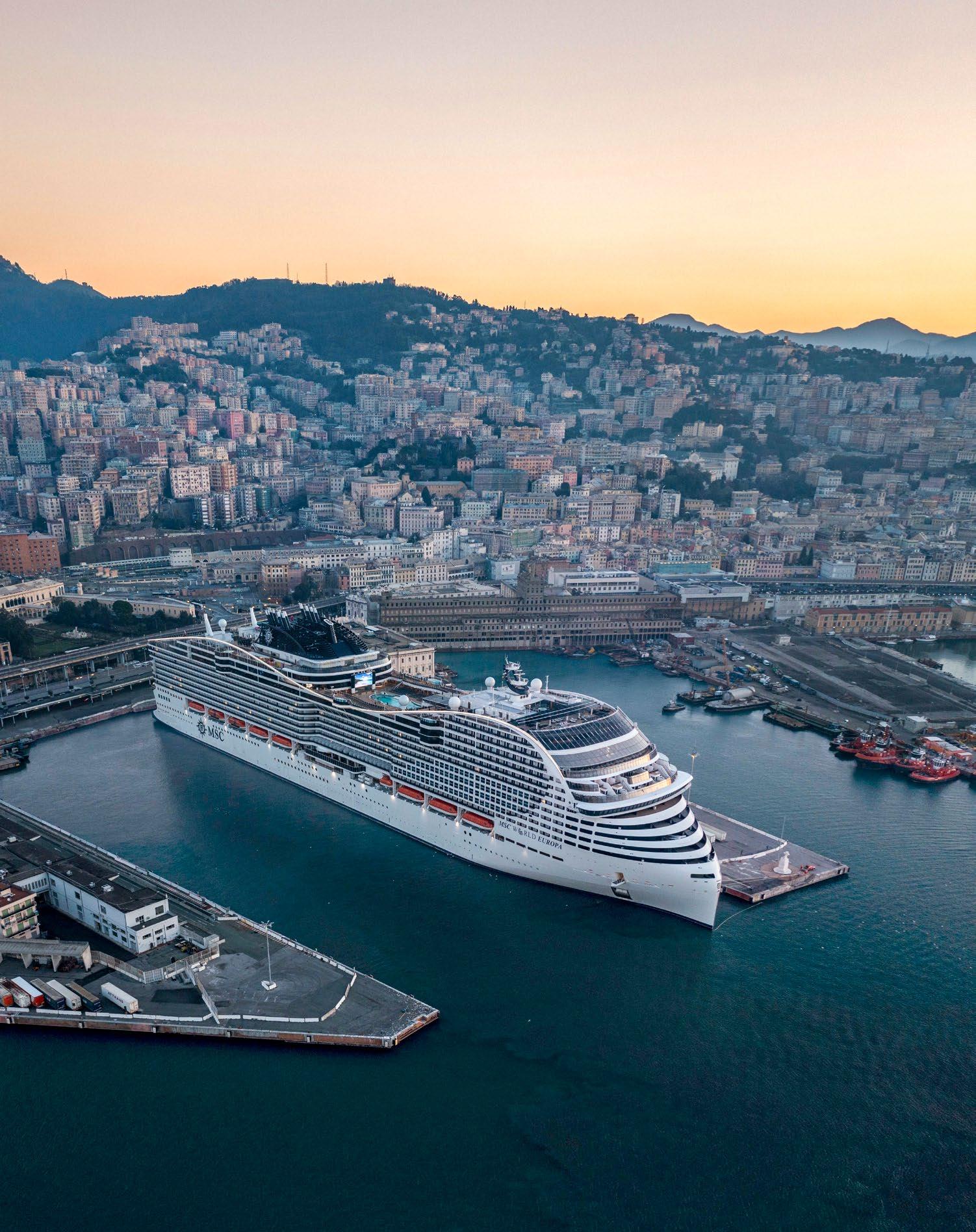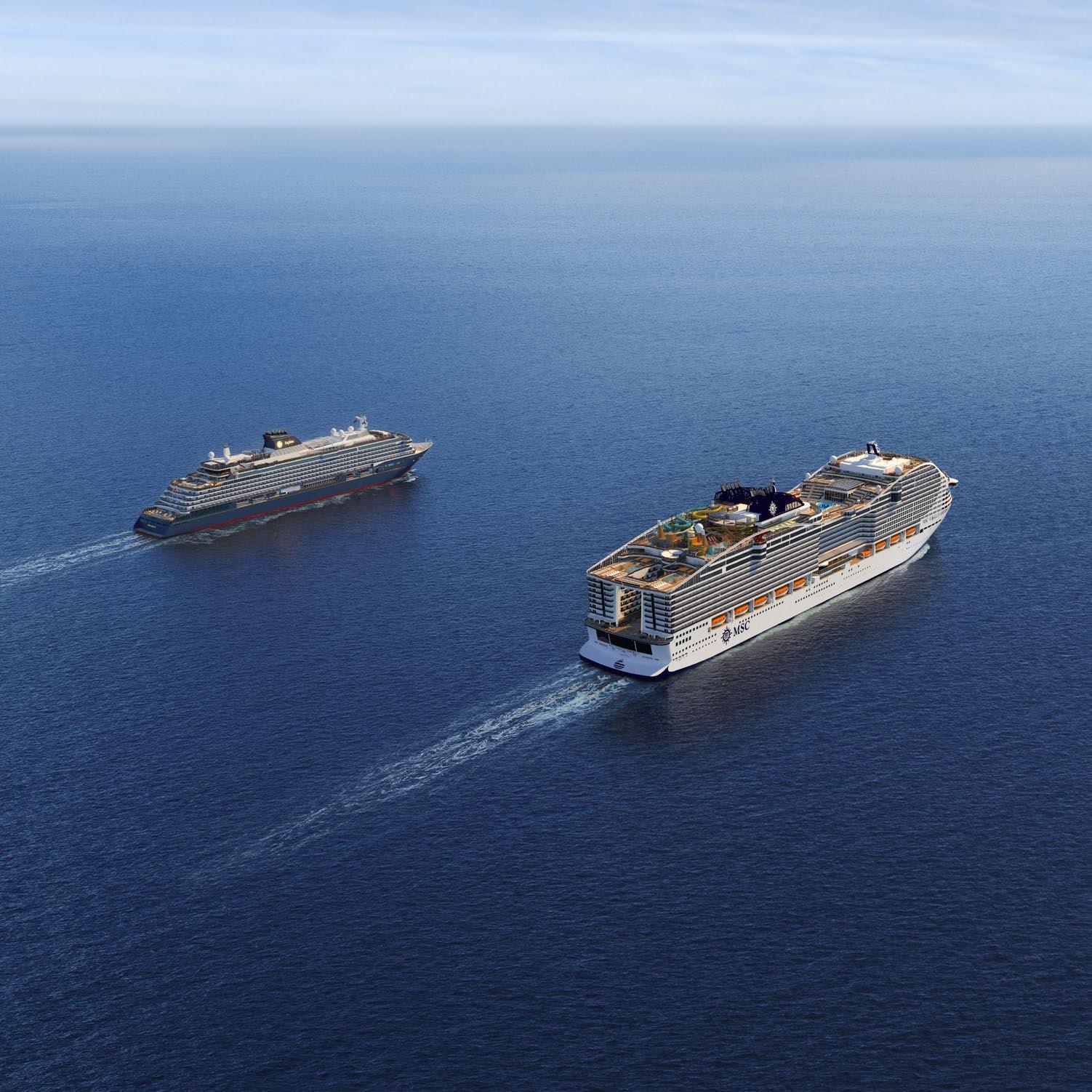
As a family business, we have the agility and the long-term vision to lead our sustainability journey with purpose
PIERFRANCESCO VAGO EXECUTIVE CHAIRMAN



As a family business, we have the agility and the long-term vision to lead our sustainability journey with purpose
PIERFRANCESCO VAGO EXECUTIVE CHAIRMAN

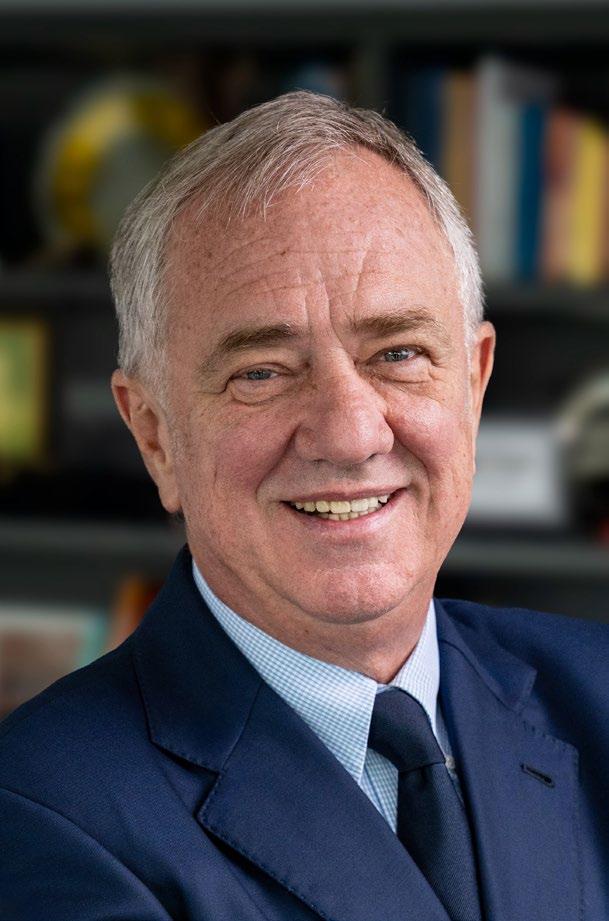
At MSC Group’s Cruise Division, sustainability is embedded as a core part of our business across the two brands – MSC Cruises and Explora Journeys. As we publish our sixth annual Sustainability Report, I am proud to reflect on our continued progress and strengthened ambition.
In 2024, the Cruise Division reaffirmed its commitment to achieving net-zero greenhouse gas emissions for our marine operations by 2050, advancing a bold and transparent sustainability strategy that balances environmental stewardship, social responsibility, and economic resilience. This year we released our Energy Transition Plan to show, clearly and openly, how we are working to achieve this ambition with clear emissions milestones on our journey to 2050.
Following the historic net-zero emissions voyage of MSC Euribia in 2023 utilising certified bio-LNG, we are continuing our work to unlock and scale new technologies for new ships and to retrofit on existing fleet, as well as seeking partnerships with renewable fuel producers in the form of long-term offtake agreements.
Our journey is also one of digital transformation. Tools like OptiCruise and Oceanly Performance are helping us reduce fuel use, optimise itineraries, and make real-time decisions that improve efficiency across the fleet. These innovations contributed to a 50,000-tonne reduction in CO₂ emissions in 2024 alone.
We have fitted shore power capability as standard on all new ships since 2017 and continue to implement the retrofit plan
for MSC Cruises. In 2024, we connected to shore power in 13 ports and made 142 successful connections, more than triple the previous year. We remain committed to encouraging global port investment in this essential infrastructure.
We celebrated the entry into service of Explora II, a vessel that I am personally proud of. It not only embodies luxury, it also received the ‘Green Plus’ award from RINA, its classification society, in recognition of its environmental performance beyond compliance obligations. Both Explora Journeys ships carry the “Dolphin” notation, recognising reduced underwater noise emissions for the protection of sensitive marine ecosystems. Once again demonstrating our commitment to seek performance beyond what is required of us.
Our people remain central to our success. With over 140 nationalities represented in our workforce, we are working to embed diversity and inclusion into our operations. In 2024, we established our first D&I Advisory Committee, reflecting our unchanging belief that a diverse workforce is a strong workforce. Attracting, retaining, and developing a skilled and engaged workforce is as important. I was pleased that the retention rate for our onboard employees rose from 83% in 2023 to 89% in 2024.
As part of our responsible tourism strategy, we worked closely with local communities and tour operators to offer over 4,500 excursions in 84 countries, including 284 low-impact “Protectours”. We are particularly proud of our continued investment in destinations like Ocean Cay, where environmental stewardship and guest experience go hand in hand.
I was personally able to witness our guests engaging with these ecosystems while snorkelling in the crystal-clear waters where coral is being restored and marine life is returning.
As a family business, we have the agility and the long-term vision to lead our sustainability journey with purpose. We do not build ships just for tomorrow. We build them for decades, and for future generations. That means building fuel flexibility into our designs and partnering with pioneers across the energy and technology sectors. It means recognising that no single company or solution can achieve this alone and it means accepting that not every trial will be a success, but that every step must move us forward. And most importantly, we recognise that our workforce is fundamental to our success.
I invite you to explore this report and learn more about our actions and ambitions. Thank you to my colleagues, our guests and our partners for your continued support as we build a more sustainable future for cruising.
This 2024 Sustainability Report covers the approach, performance, and governance processes of MSC Cruises S.A. as they relate to our identified material sustainabilityrelated risks, opportunities, and impacts.
The purpose of this report is to make sure that our employees and external stakeholders have clear, useful information about our environmental, social, and governance (ESG) status, commitments and progress. We are readying our sustainability reporting for full compliance with the European Union Corporate Sustainability Reporting Directive (CSRD) and have begun to align our reporting with its requirements, acknowledging that the Directive is under review by the EU authorities.
Reporting scope and boundaries
This report has been compiled on a consolidated basis and covers the owned and operationally controlled entities of the Cruise Division of MSC Group, incorporating both MSC Cruises and its luxury sister company, Explora Journeys.
Our travel agency group, Bluvacanze, is outside the scope of this report. Although it is a wholly owned subsidiary of MSC Cruises, it publishes its own standalone report.
The boundaries and disclosed policies, actions, targets, and related data in this report span our upstream and downstream value chain to encompass all owned and operationally
controlled terminals, destinations, ships, warehouses and offices (including European and non-European offices reporting into our Switzerland-based headquarters) unless otherwise indicated.
This report is approved by our Sustainability Advisory Board (SAB), chaired by the Executive Chairman, a member of the MSC Cruises S.A. Board.
It covers the fiscal year January 1, 2024, to December 31, 2024.
For the purposes of this report, when reference is made to both MSC Cruises and Explora Journeys, the term Cruise Division is used.
Sustainability standards and frameworks
We are committed to full and transparent sustainability reporting.
The maritime sector is a highly regulated industry, operating under strict compliance guidelines, and we implement these in full. We are bound by the conventions of the International Maritime Organization (IMO), the International Labour Organization (ILO), plus the standards of all national, regional and local authorities that we operate in and travel through. This includes European regulations such as the EU Emissions Trading System and the Fuel EU Maritime.
Recognised organisations such as Bureau Veritas and RINA play a key role in verifying our adherence to class and statutory regulations on behalf of Flag States, as well as verifying compliance against additional voluntary class notations and standards.
Our programme of continuous improvement means that we aim to go beyond mandatory compliance and have voluntarily adopted six ISO (International Organisation for Standardisation) standards, an important commitment for our business. See page 35 for more information.
All our fuel and greenhouse gas emissions data is subject to third party verification under both IMO and EU monitoring, reporting and verification obligations. In addition, we voluntarily seek external assurance for local air quality emissions data (sulphur oxides and nitrogen oxides).
This report covers our short-, medium-, and long-term sustainability commitments, aligning with established methodology frameworks such as the Greenhouse Gas (GHG) Protocol for emissions reporting. Where necessary, we highlight improved data accuracy, methodological updates, or changes in organisational structure from previous year reporting.
We have started to align our data disclosures with the European Sustainability Reporting Standards (ESRS). All data is from
direct sources unless stated in issue-specific disclosures. For each material topic we make clear whether data is directly measured or estimated.
We have established robust internal controls for our data management, collection and verification, linked to business criticality and compliance. For data on air emissions, wastewater, waste management and health and safety, regulatory requirements ensure that sufficient internal resources and checks are in place to align with global, regional and national obligations.
The Sustainability Team coordinates and consolidates this data in collaboration with relevant business units, with assigned data collectors responsible for collecting and submitting performance data into a global online data collection system. Sustainability reporting risks are reviewed at SAB meetings, and the Executive Chairman and CEOs approve the Sustainability Report before publication.
Sustainability reporting risks include data accuracy and completeness influenced by human input errors, evolving regulations or the absence of accepted reporting standards for certain disclosures. To help mitigate these, we provide assigned data collectors with training on our online data management tool, including group sessions and one-toone assistance.
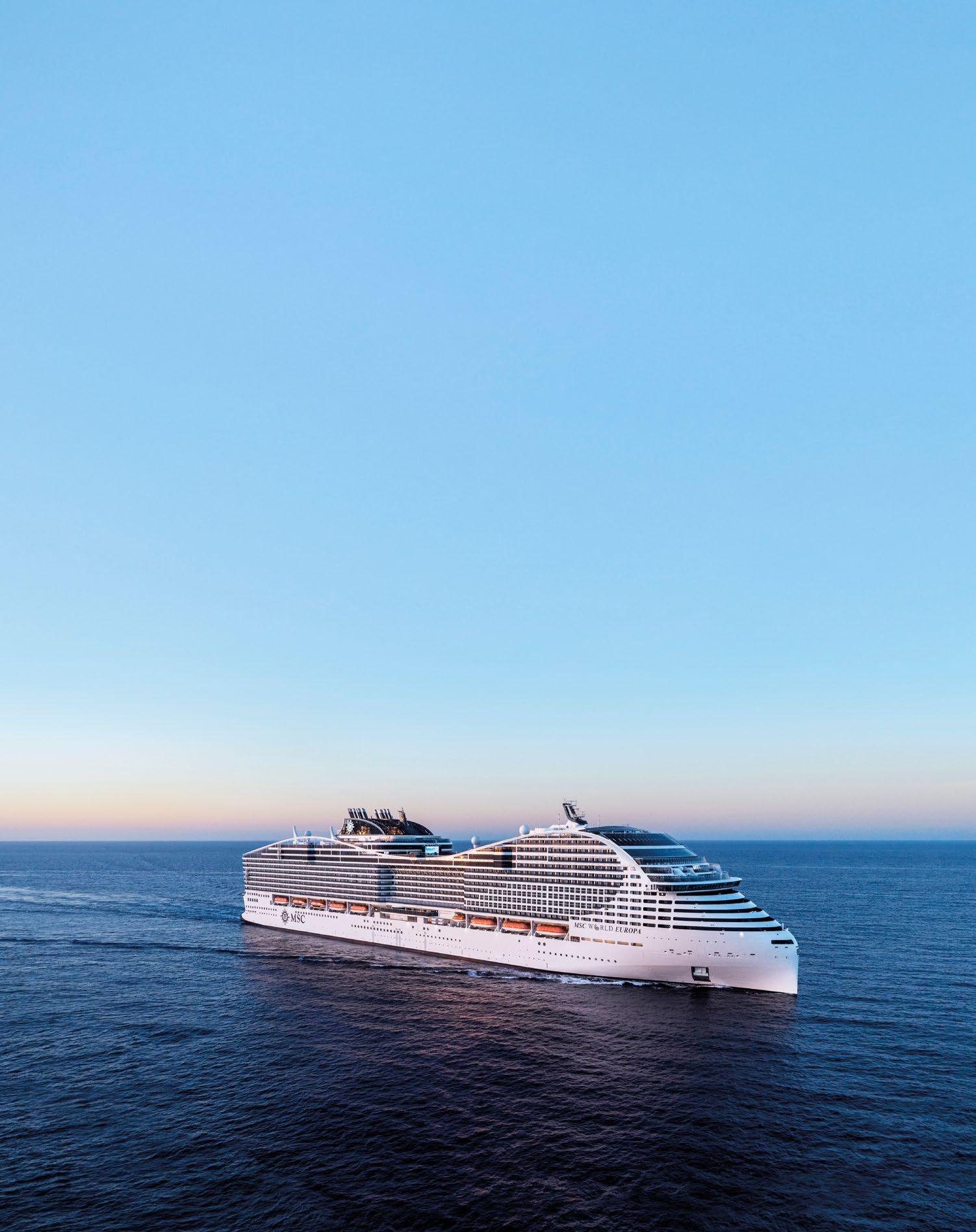
MSC Cruises and Explora Journeys are part of the MSC Group, a leading privately held Swiss-based shipping and logistics conglomerate, headquartered in Geneva, Switzerland.
MSC Cruises is the world’s third-largest cruise brand and is the leader in Europe, the Gulf region, Southern Africa and South America. We also have a strong presence in the Caribbean, the Far East and North America.
At the end of 2024, we operated a fleet of 24 ships, across the two brands, operating 365 days a year. They are captained by our team of highly qualified Masters.
Our total workforce in 2024 was 49, 684. In 2024, we welcomed more than 4.6 million guests onboard.
Our vision
To be the world’s leading provider of cruise holidays, offering exceptional experiences to guests while supporting local communities and minimising our impact on the environment.
Our values
Our company values are the cornerstones of our business, supporting our vision, shaping our culture and driving responsible and innovative practices.
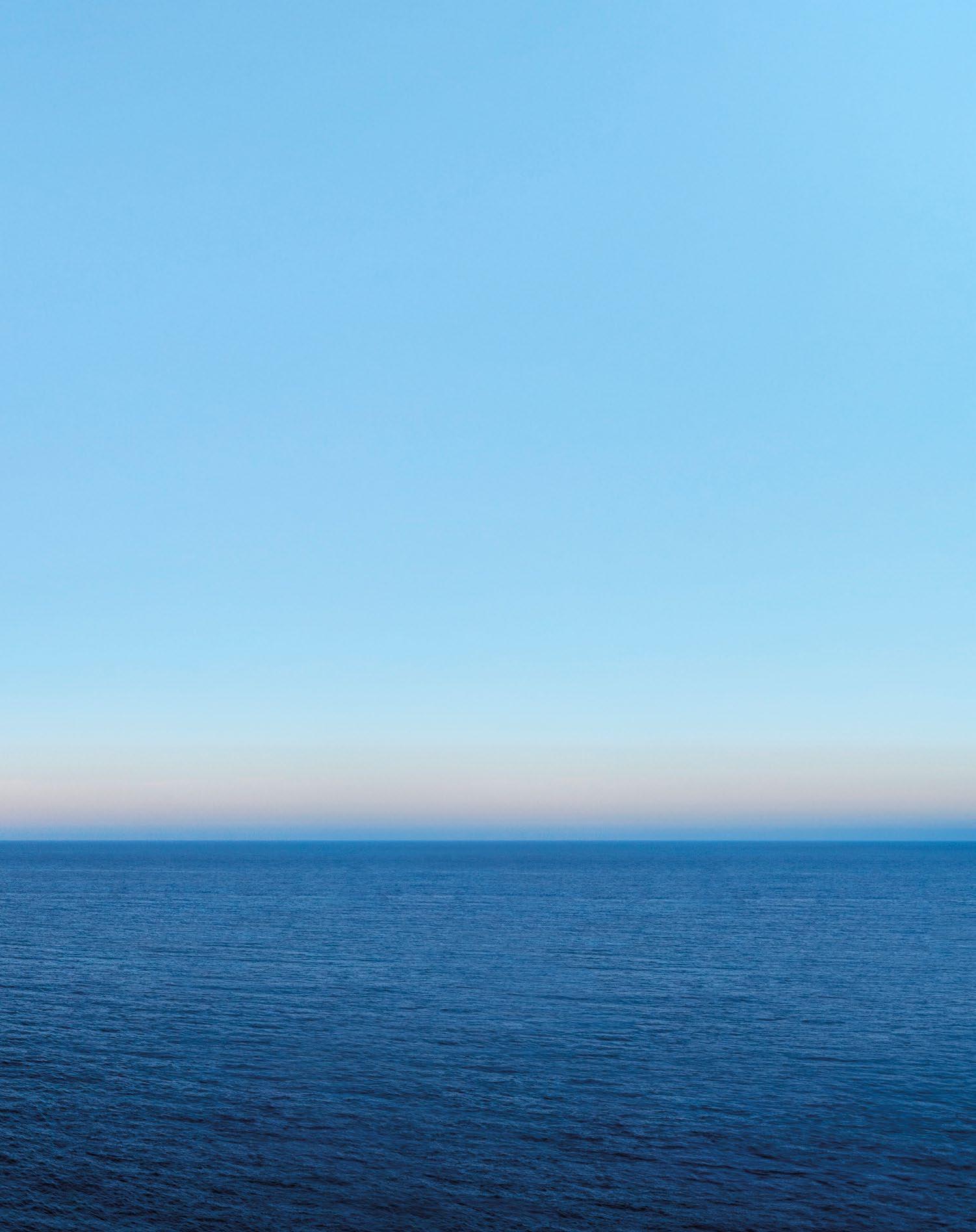
Operating days 7,628 469
Available lower berth days (ALBD)
26,888,573 432,418
Guests carried 4,572,719 28,725
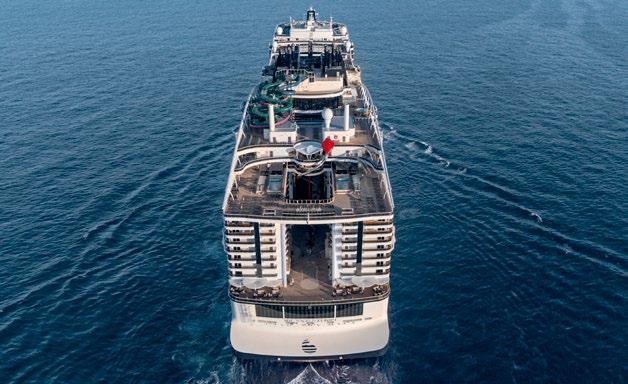
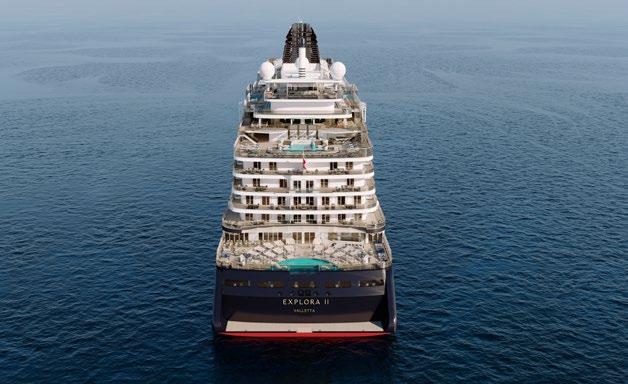
SHIPS 9 SHIPS ON ORDER







MSC Cruises is the third largest global cruise brand. The leader in Europe, South America, the Gulf region and Southern Africa and a strong and growing presence in the Caribbean, North America and Far East Market.
New terminals delivered in 2025
Wholly or majority owned and operated terminals and destinations
Crew training centers
NORTH AMERICA & CARIBBEAN
4 ships summer
6 ships winter
SOUTH AMERICA
6 ships winter
NORTHERN EUROPE AND THE MED
17 ships summer
6 ships winter
SOUTHERN AFRICA
1 ship winter
ASIA
1 ship summer
1 ship winter
UAE AND QATAR
1 ship winter
Our business strategy is built on five main pillars:
We are continuing to build one of the world’s most modern cruise fleets. Between 2025 and 2030 we are investing €9.5 billion in nine new vessels, increasing our fleet to 33 ships. These will incorporate innovative design and technologies that support our energy transition.
We continue to invest in our existing fleet, upgrading our vessels to improve efficiency, to manage potential operational constraints in the future and to support our net zero greenhouse gas emissions ambition for marine operations.
See our Environment chapter for more information on our energy transition.
We are growing our operations in existing markets as well as expanding into new markets. During 2025, our new vessel, MSC World America, will be added to our operations in North America and we will begin operating in Alaska in 2026.
We are also exploring emerging markets, being mindful of our responsibility to work together with the people who live there to bring benefits beyond cruise-related revenues.
We continue to develop new terminals, with Barcelona and Miami becoming operational in early 2025.
In addition to upgrading and modernising our fleet, we are continually improving the experiences of our guests by tailoring our services to provide more personalised, premium products and experiences.
We are creating more shore-based experiences which align to the expectations of the local community – for example, low-impact experiences or those which include naturebased awareness and education. In 2025, we will introduce a wider range of shore excursions for those with disabilities, working collaboratively with an established expert in the provision of innovative accessible travel.
We use a Net Promoter Score (NPS) to measure our guests’ satisfaction, calculated using extensive guest feedback. We use this feedback to identify and prioritise actions to improve our guest experience.
See our Social chapter for details on how we improve guest experience.
To meet the needs of our expanding business, we need to grow and develop a high-performing workforce. We aim to employ a diverse workforce, including from regions where the cruise industry has not historically been a significant employer. Their skills and diverse cultural representation provide value for our business and allows us to recruit the most capable and competent talent.
In addition to considering the safety and wellbeing of our people, we aim to provide career progression opportunities. Each ship has a dedicated Learning & Development Manager onboard to support training and career development. The retention rate of our crew was five percentage points higher in 2024 than 2023, an achievement which supports the growth of our operations as we map our recruitment requirements going forward.
See our Social chapter for more information on how we support and help develop our workforce.
Supporting communities
Engaging with local communities in the areas in which we operate remains a focus area for us.
As we grow, we are mindful of our responsibility to work together with local communities and authorities to better manage tourism flows and support lower-impact tourism, extending benefits beyond cruise-related revenues.
As well as meeting the expectations of our guests, we aim to provide social and economic benefit to the destinations we visit. Our dedicated Sustainability & Community Engagement Manager provides focused engagement with the communities within which we operate, through coordination with onshore departments including port operations, shore excursions, and government affairs.
Collaboration across the industry, including with the Cruise Lines Industry Association (CLIA) enables an impactful cross-industry approach to addressing concerns such as over-tourism. CLIA studies have shown substantial economic contributions, from both the cruise lines and the guests we carry, including guest and crew spend in shops and restaurants, tours and excursions, port fees, and the sourcing of local supplies for our ships.
See our Social chapter for information on how we engage with communities.
› More than 75% of jobs supported by cruise activity are generated by the industry’s onshore activities, particularly at ports, equating to around 910,000 jobs.
Source: CLIA Economic Impact Study, 2024

We aim to deliver exceptional cruise experiences to our guests on our fleet of ships around the world, while creating benefits across a wide and varied value chain.
We work very closely with our shipbuilders to design and construct state-of-the art ships that offer comfort and luxury while minimising their environmental footprint. Our international network of suppliers provides the items needed to furnish each ship.
We have a significant demand for human resources – both as crew for the ships but also on land in our support functions –and directly employ more than 49,000 people. We rely on an extensive network of local tour operators to provide transport and excursions for our guests.

We create measurable value across our value chain activities
Delivered assets
Inputs across the value chain
• Shore facilities including offices and terminals
• Ship design and delivery
• Retrofits and maintenance activities
• Construction materials
• Onboard consumables
• Fuel and other energy needs
• Third party workforce activities
• Shore based employees
• Onboard crew
• Fleet operations and maintenance
• Offices and other facilites
• Port and terminal operations
• Excursions and local tourism
• Local transport
Outputs and outcomes
1 Explora Journeys ship delivered
6 Dry docks
2 Shore power retrofits
5,559 vendors from 107 countries
8,267MWh of shore power to our ships
30 million cage free fresh eggs
39 destinations utilising hybrid or electric vehicles for shore excursions Materials and supplies Workforce Operations Destinations
3,301 shore based employees
46,384 crew 144 nationalities
8,381 new crew hires in 2024
586,029 hours of crew training
4,601,444 guests
16 ships shore power enabled 41.5% onboard waste segregated for recycling
341 cruise itineraries in 90 countries
4,870 unique shore excursions
Effective stakeholder engagement is fundamental to our long-term success and we do this through meaningful dialogue and collaboration. We initiate and foster open and honest communication, aiming to build trust and address concerns proactively, which allows us to balance the needs of our stakeholders with our business objectives.
Employees Our people want to work for a company that is committed to:
• Corporate ethics
• Sustainability
• Ensuring everyone is healthy and safe
• Career development and training
• Providing a diverse and inclusive environment
Shipbuilders Our shipbuilders design and construct vessels to comply with current regulations and are able to adapt to align with future expectations. This includes expectations around the following key issues:
• Energy efficiency and climate change
• Air emissions
• Water and wastewater management
• Safety of those on board
Ports Our ships bring many guests to ports, which can:
• Put pressure on port infrastructure and contribute to overcrowding
• Create actual or potential environmental impacts such as local air emissions and marine habitat disturbance
• Require ports to invest in new infrastructure, such as shore power, fuel bunkering and onboard provisioning needs.
We draw on multiple formal and informal touchpoints to both give and receive feedback, including:
• Education including trainings across different disciplines
• Individual Performance Management process
• Whistleblowing policy
We are building awareness of sustainability priorities and activities across the business through:
• Communication channels such as MSC Connect, our intranet platform
• Regular sustainability webinars to keep our people up to date on key regulations and other ESG priorities.
We conduct extensive engagement with the shipyards at every stage of ship design and construction. This is focused on ensuring the incorporation of innovative design to support our decarbonisation goals, pollution prevention and ensuring guest expectations are met.
We collaborate with ports to manage tourism, including staggering ship arrival and departure times, agreeing on visitor limits and port call frequencies.
We also engage by:
• Supporting infrastructure investment, including in new terminals.
• Providing ports with accurate social and environmental data, including information needed to support new port infrastructure.
• Actively participating in Port Associations such as Cruise Europe, MedCruise, and engaging with other cruise lines as part of the CLIA Ports and Destinations Committee to identify common solutions.
STAKEHOLDER STAKEHOLDER’S CONCERNS/ OUR EXPECTATIONS
Guests
We notice that our guests are increasingly interested in the environmental performance of our ships and the impact of cruising on the destinations we visit.
Other topics of interest are: health and safety, the provision of an inclusive and accessible environment, and their experience onboard and during excursions.
Guests expect actions to be taken to address their comments and concerns.
Suppliers
Our suppliers require clear information about our procurement policies and practices and our expectations for managing risk in our supply chain.
In turn, they expect to be treated fairly by us and to be paid on time.
We engage and communicate with our guests before, during and after their cruise:
• Onboard, we communicate ship features which relate to environmental performance, e.g. using signage in cabins and other public areas.
• The MSC for ME app is used to inform guests about all aspects of their cruise.
• Post-cruise surveys allow guests to report back on all aspects of their cruise experience. These are assessed and used to prioritise actions and improvements across shore excursions, itinerary, crew competency, guest service, cleanliness, entertainment, onboard activities, dining and providing value for money.
We foster constructive dialogue with our wide range of suppliers through onboarding and screening as well as one to one engagement.
Our buyers are provided with guidance on environmental considerations in procurement and clear payment protocols.
In 2024, a process of identifying risks in the supply chain was instigated using the EcoVadis performance rating tool.
Member organisations
We engage with member organisations on a wide range of environmental and social issues.
Our participation in events, discussions and committees attended by our industry peers allows us to contribute to a collective voice which can help to shape policy decisions.
Our membership with many international organisations allows us to be informed and influence global activity affecting the cruise industry. We are a member of CLIA, with a presence on many key committees.
We are represented on key influential organisations including the World Travel and Tourism Council, the International Chamber of Shipping and the World Shipping Council. We have MSC Group representation on the Swiss delegation to the IMO and we are members of national shipowner associations such as Assarmatori and the UK Chamber of Shipping.
Community & civil society
Communities expect a collaborative relationship with the cruise industry and wish to benefit from value creation.
We recognise the need to ensure effective engagement aligned with potential concerns and opportunities across a range of social and environmental issues including:
• Local economic impact
• Local air emissions and pollution
• Water discharge and pollution
• GHG emissions
• Resource use and waste
• Ocean and coastal biodiversity and ecosystems
Regulators and policy makers Regulators and policymakers determine and maintain legal boundaries, in response to changing external conditions and expectations.
We aim to ensure that new regulations are effective, fair, and will support the cruising industry on its safety and sustainability journey.
We visited 301 unique destinations in 2024 and collaborated with affected communities through proactive engagement.
Attending port- and destination-focused industry events helps us to effectively communicate our ESG credentials as well as encourage active dialogue and partnership.
Our alliances with civil society are built on open communication, allowing us to share expertise and develop joint initiatives on shared priorities.
Financial / Insurance Lenders and insurance providers are increasingly interested in ESG performance, and climate risk management for the assets they finance.
As we seek financing for new vessels, and shore-based infrastructure such as terminals, we acknowledge these expectations.
We engage with policy makers and regulators to anticipate and influence evolving maritime and environmental standards and ensure effective compliance.
These discussions are led primarily by our Government Affairs and Maritime Policy team and occur at local, national and international level, with the support of our Sustainability team.
We engaged directly with members of the financial community as part of our double materiality process and on an ad hoc basis regarding our energy transition plans.
CLIA is the world’s largest cruise industry trade association, representing 95% of the ocean cruise industry by capacity. MSC Cruises’ Executive Chairman, Pierfrancesco Vago, previously held the position of CLIA Global Chair and is now the Chair of CLIA Europe.
We have representatives on key CLIA committees, including the Global Environment Committee, the Sustainability Advisory Committee, the European Government Affairs Committee, the Ports and Destinations Advisory Committee and the Labour Task Force, testament to the importance the business places on the global and regional role of CLIA on all cruise regulatory and policy matters.
Every time our Sustainability Advisory Board meets, updates are provided on sustainability-related stakeholder insights or concerns. When action is required, this is also communicated internally.
Stakeholder engagement remains an important factor in helping us to identify our material issues as part of our double materiality assessment which in turn informed the content and disclosures of this report.
Some examples of how stakeholder feedback impacted our operations in 2024 include:
• Crew surveys have informed onboard living improvements, in 2024 this included additional laundry services for crew and improved internal food options in the crew canteens.
• Extensive engagement with communities in which we operate has resulted in focused activities in ports and destinations including ship visits, crew volunteering activities and school visits.
• Engagement with regulatory stakeholders, our ship builders, engine providers and other technology solutions providers has helped inform our energy transition plan.
• Frequent engagement with local and national authorities aimed at establishing practices that exceed applicable rules and regulations, including commitments such as Blue Flag agreements and national charters.

In 2023, we conducted a double materiality assessment for our business which we further refined in 2024. As we continue to progress towards alignment with the European Sustainability Reporting Standards (ESRS), this process has enabled us to identify material impacts, risks and opportunities across our value chain, considering both impact and financial materiality.
Impact materiality - Assesses the actual and potential sustainability impacts (whether environmental, social or governance-related) from the activities of our Cruise Division and/or business relationships.
Financial materiality - Evaluates how environmental , social and governance issues influence our business development, financial position and value, including risks of financial losses as well as potential opportunities.
To ensure a 360-degree perspective of the business, we gathered insights from our key leaders and internal subject matter experts including those engaged in energy and fuel use, environmental compliance, procurement, health and safety, diversity and inclusion, community engagement, learning and development, ports, fleet and hotel operations, customer journeys, compliance and risk management, and government relations.
We also considered the views of key external stakeholders, incorporating feedback that had been provided to our colleagues throughout the year. This included insights from affected stakeholders, as well as external sustainability experts and users of our Sustainability Report.
Identification and development of our sustainability-related impacts, risks and opportunities (IROs) was a collaborative process. We identified the business owners responsible for approving, refining, and confirming materiality, as well as identifying existing policies and targets. These subject matter experts were invited to a series of webinars and one-to-one meetings to ensure stakeholders across the business were fully aligned with the process and their responsibilities.
This Sustainability Report is structured to align with the ESRS requirements, with each IRO identified in the relevant chapter, and disclosures aligned to those required by the standard, such as information on governance, strategy, policies, metrics, and targets as available.
Our material IROs inform our business strategy. We enable this by developing policies and setting targets which are clearly communicated though our governance practices. Our Executive Chairman is the Chair of the Sustainability Advisory Board (SAB), which also includes the CEOs and all concerned management functions, to oversee and approve policies and targets related to our IROs.
All identified sustainability-related material impact, risks and opportunities (IROs) considered material are presented in the chart with a reference to the ESRS topical standards.
(S1) Employee health and safety
(S3) Local economic impact
(S3) Community relations
(S4) Guest exclusivity and accessibility
(G1) Guest inclusion
(G1) Animal welfare
(E1) Climate change
(E1) Energy & fuel consumption
(E2) Air Pollution (E2) Water pollution (E3) Water consumption (E4) Biodiversity (E5) Onboard resources and waste
(S1) Employee wellbeing
(S1) Value chain workers
(S4) Guest health and safety
(G1) Business conduct
(E1) Adapting to climate change
(S1) Training and development
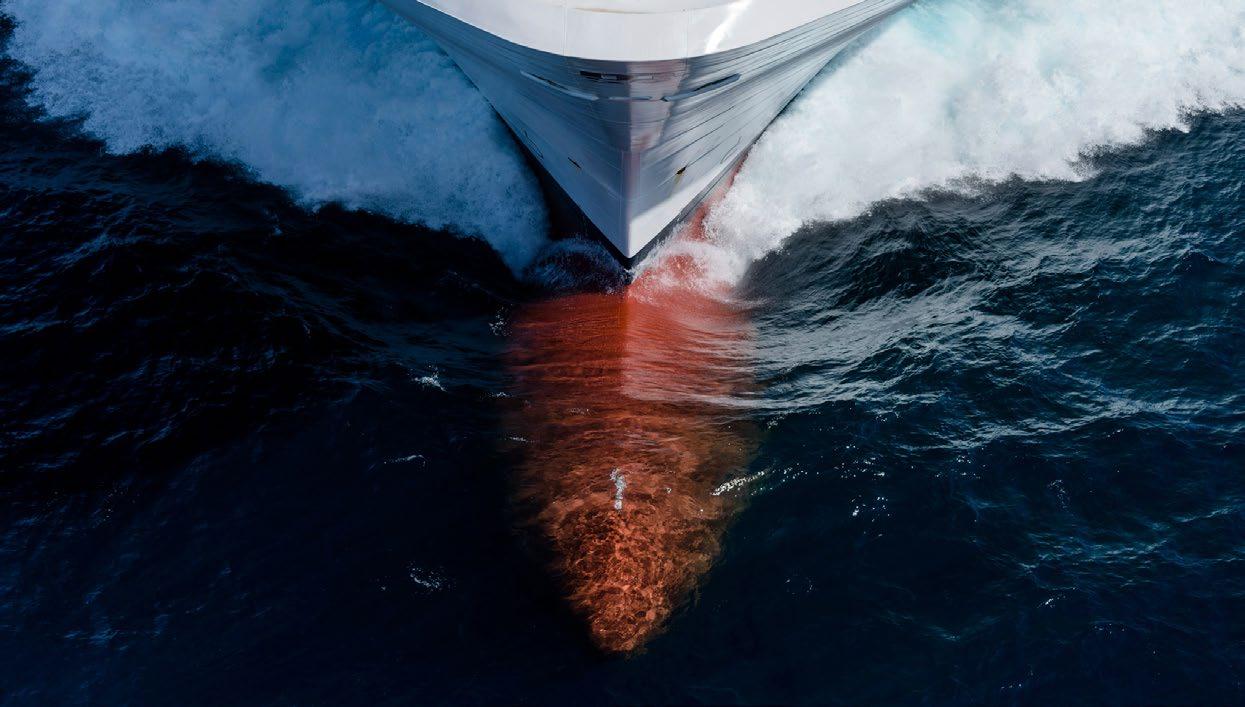
Sound corporate governance is fundamental to every aspect of our business. Strong governance frameworks help protect the interests of employees, guests, and all our stakeholders, contributing to transparency, accountability and trust, driving our long-term success and operational excellence.
All MSC Cruises entities follow our Corporate Governance Procedure. Our Corporate Governance Committee supports the Board of MSC Cruises S.A. and the Executive Chairman to ensure that a strong governance framework is in place. Appropriate review and evaluation processes are carried out to select the Board members and appointed Directors of our subsidiary entities.
We are proud to be a family-run business. The highest level of accountability for the delivery of our ESG strategy and approval of our Sustainability Report sits with the Executive Chairman who also holds the position of Chair of the MSC Cruises S.A. Board. This Board comprises three senior family members.
The Sustainability Advisory Board (SAB) is chaired by the Executive Chairman, with members including the CEOs of both MSC Cruises and Explora Journeys and key senior management across core business functions. The SAB delegates the management of specific material impacts, risks and opportunities (IROs), identified though the double materiality assessment, to a range of dedicated committees and teams, led by senior business leaders. They are responsible for data reliability and ensuring the effectiveness of the policies, actions, metrics and targets adopted, inviting additional subject matter experts as required. Actions and progress are reported to the SAB regularly.
The committees play a crucial role in facilitating effective discussions and reaching agreements on IROs that require cross-functional collaboration. This ensures alignment with business obligations and the maintenance of our high ethical standards. These committees assign specific tasks to teams and individuals for effective IRO management.
The Sustainability Team works across global operations, with business owners, to ensure that the responsibilities for reducing risk, managing potential impacts, or maximising opportunities, are fully integrated into relevant procedures and policies.
Sustainability skills and experience
The Boards of the MSC Cruises Group entities around the world are composed of highly qualified individuals with diverse backgrounds and expertise, who possess the necessary skills, experience, and independence to perform their roles effectively. Each Board includes both local representatives and corporate members to comply with local legislative requirements and corporate governance policies.
Our Corporate Governance Committee assesses skills, expertise and experience to ensure individuals can effectively fulfil their roles. Alongside this, the Boards and Corporate Governance Committee regularly review the training and development needs of directors, considering the changing business environment, emerging governance trends, and required competencies.
All directors are provided with access to relevant training programmes and resources to enhance their knowledge and skills. They are encouraged to participate in ongoing education programmes, seminars and industry conferences to stay informed about best practices and emerging governance issues.
The Sustainability Team brings a strong and diverse skill set, combining decades of industry knowledge and expertise in environmental management, regulatory compliance, sustainability strategy development, marine engineering and corporate management. They actively participate in all relevant governance committees, providing critical context and insights to support colleagues’ informed decision-making.
Incentive schemes and remuneration policies
When transparent and in the right context, linking executive remuneration to the realisation of long-term ESG targets can reinforce leadership accountability and drive measurable progress, helping to build a culture of sustainability from the top.
Onboard our ships, several senior positions have performancerelated incentive schemes relating to energy efficiency and crew and guest satisfaction. For energy efficiency, this is linked to actual fuel consumption compared to budgeted fuel. For crew and guest satisfaction, this is calculated based on the annual crew survey and the results of post-cruise guest surveys.
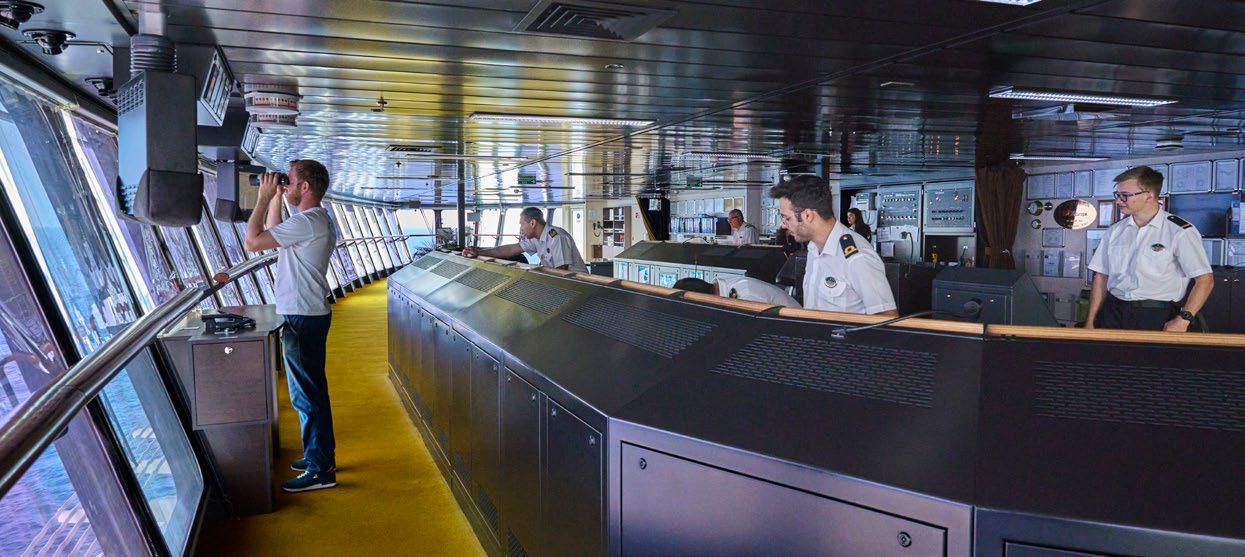
Chaired by the Executive Chairman. Other members are the MSC Group Chairman and the MSC Group Chief Financial Officer
Chaired by the Executive Chairman, with CEOs and senior management representatives from core business functions
Led by the Vice President Sustainability & ESG
Chaired by the Sustainability & Community Engagement Manager
Chaired by the Chief Advisory & Audit Officer
Chaired by the Compliance Officer
Responsibilities include key decision-making to support the management of sustainability related impacts or risks identified as material.
IROs are communicated and management/actions are reported to the Board from the SAB. Key issues that may be included include energy transition plans, regulatory updates and resource requirements with appropriate decisions and actions sanctioned.
Internal subject matter experts are invited to the Board meetings as required to ensure the sharing of information that informs the Board’s agenda.
Responsible for setting out the sustainability strategy across the two cruise brands.
IROs are assigned to individuals, teams or committees, with actions reported to the SAB, either directly or through the Sustainability Team.
The Sustainability Team presents the proposed sustainability strategy, and processes and responsibilities for managing IROs to the SAB for discussion and approval. The SAB is also the forum for approving new policies and targets and reporting progress on these.
Responsible for recommending the sustainability strategy to the SAB and its subsequent implementation. The team ensures progress on IROs is reported at the SAB, either through a relevant SAB member or through consolidation by the VP Sustainability & ESG.
Oversees the shoreside sustainability activities relating to port operations, terminal development and operations, shore excursions and ground transport. The Committee tracks progress against approved actions for management of assigned IROs.
Ensures an appropriate corporate governance framework is in place for the entire Cruises Division. Internal subject matter experts are invited on a case-by-case basis to manage specific business and operational topics.
Reviews compliance matters raised either through our anonymous Speak Up line or made directly to the compliance team. Each matter is first investigated by the Compliance Officer, and the committee is responsible for agreeing corrective action and mitigation. The most serious cases are escalated to Top Management.
Data Privacy Committee
Chaired by the Data Privacy Officer
Sustainable Procurement Committee
Chaired by the Chief Procurement Officer
Responsible for reviewing issues and risks related to data protection. The committee can take action to resolve these, as required, or escalate them for discussion by Top Management.
Responsible for improving the sustainability performance of our supply chain and the products and materials we bring on board.
This group has oversight of the supplier assessment process using the Ecovadis tool and in deciding action for suppliers that do not comply with our risk management obligations.
Sustainable Communications & Marketing Committee
Chaired by the Chief Communications Officer
Health, Environment, Safety and Security Committee
Chaired by the President of MSC Cruise Management (UK)
Health Steering Committee
Chaired by the Executive Chaiman
Diversity and Inclusion Committee
Chaired by the Head of Diversity, Inclusion and Wellbeing
Responsible for ensuring that we communicate responsibly and accurately about our ambitions and achievements to guests, industry partners, key stakeholders and the public.
This group is attended by the marketing and communications teams, plus representatives from the sustainability and legal teams. This ensures all those responsible for external communications and consumer engagement are aware of our sustainability commitments and how these can be accurately and responsibly communicated.
Responsible for overseeing the safe and secure operations of the fleet and ensuring a safe and healthy environment onboard for crew and guests.
This includes reviewing operational activities, including accidents and incidents which inform future action.
Attended by senior medical and health practitioners within the business, with senior internal legal representation and an external medical consultant, this committee reviews the annual medical report, discusses new projects and reviews any serious medical-related concerns. It is responsible for reviewing measures to manage relevant IROs , effectiveness of policies and proposing improvement targets.
With representatives from across our global operations and four external experts, this group is tasked with approving the D&I agenda and actions for the business, including action plans aligned with the results of the annual D&I survey, as well as ensuring policies and actions are in place to manage IROs relevant to diversity and inclusion.
Due diligence is embedded in our business through key policies, including the Code of Conduct for employees, the Business Partners Code of Conduct, Human Rights Policy, Modern Slavery Statement, and Child Labour Policy, as well as through extensive policies and procedures covering marine environment and biodiversity protection, supply chain stewardship, and crew health, safety and wellbeing.
Information on our due diligence approach around specific material issues is described within the relevant chapters of this report.
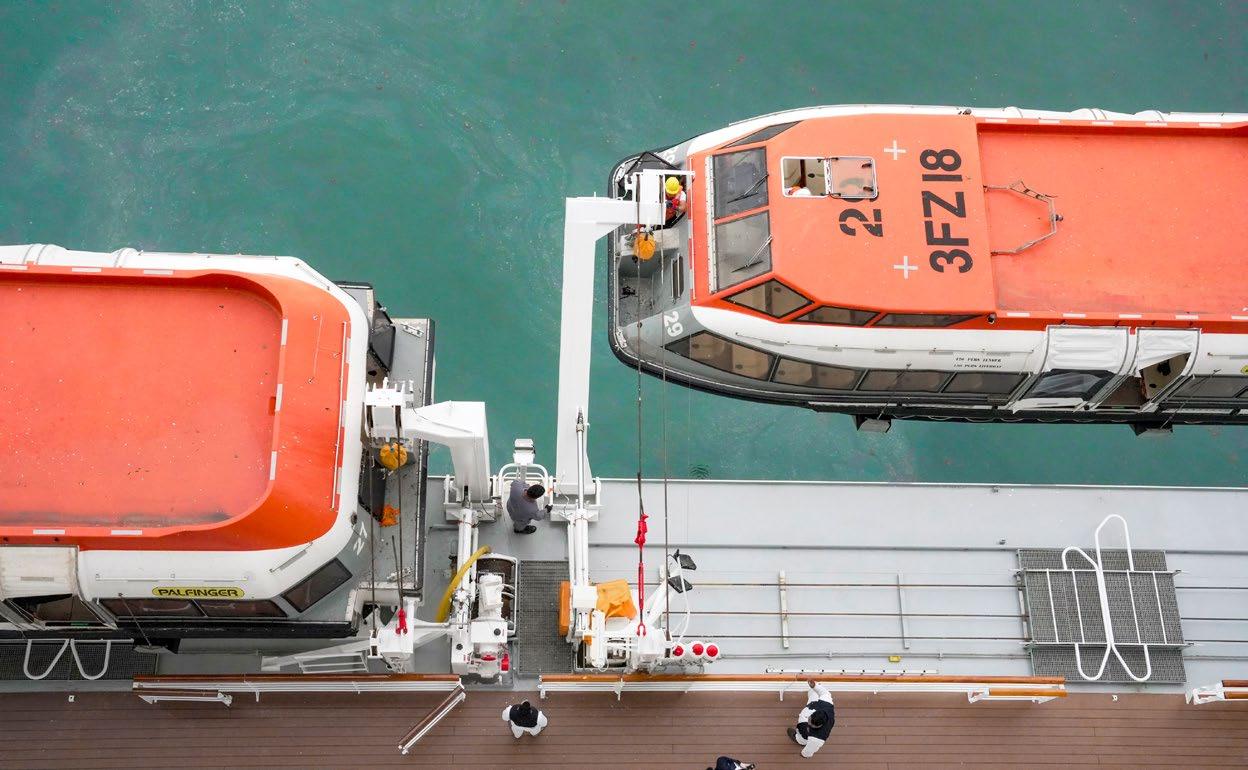
Timely risk identification and mitigation are key priorities for our business. We regularly assess a wide range of businessrelevant risks, including those that are related to ESG. This process guides key business decisions and activities.
Risk governance
Sustainability risk is overseen by the Audit & Advisory Department which conducts assessments of risk and internal control systems in accordance with the established advisory and audit methodology. The methodology for identifying riskrelated IROs are aligned with the likelihood and consequence scoring of the corporate risk assessment policy and process.
The Executive Chairman and CEOs are provided with audit and assessment results to inform strategic business decisions.
Risk identification and management process
A whole value chain approach is applied to the process of risk identification and mapping, with both qualitative and quantitative risk assessments conducted for onboard and shore based activities. As part of this process, specific sustainability issues and risks are identified.
The Internal Audit Team conducts periodic risk assessments to determine the annual Audit Plan and prioritise audit engagements for the year. If audit engagements related to sustainability are included in the Audit Plan, the Audit Team collaborates with the Sustainability Team, as necessary, to manage these engagements in alignment with the Group’s risk appetite.
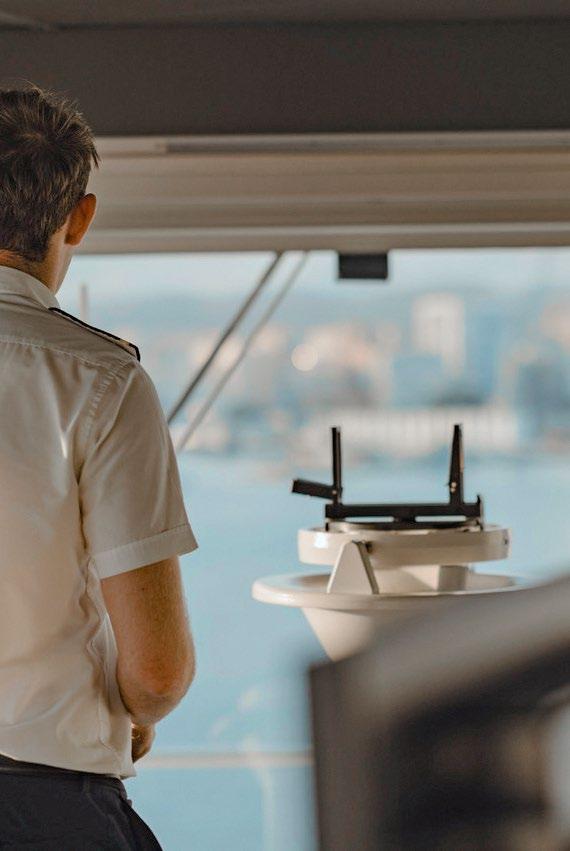
Our success comes from providing outstanding service to our guests, while always striving to conduct business responsibly and with the utmost integrity. To ensure our ethical approach is embedded in our business, we abide by our Code of Conduct and expect our partners and suppliers to do likewise, as reflected in the Business Partners Code of Conduct, which mirrors our own.
The main elements of the Code of Conduct offer clear guidance on identifying, preventing and addressing risks, as well as the consequences of breaches.
We revised the code in 2024. We strengthened our privacy programme to meet evolving standards, embedding privacy-
by-design principles in guest-facing technologies and shipboard systems. We continue to prioritise transparency, data minimisation, cybersecurity, and enhanced data rights processes with thorough vendor oversight.
In 2024, we conducted an awareness raising campaign to ensure all employees are fully informed about their responsibilities.
Employees, including new hires, are required to complete training on the Code. Onboard crew undertake both digital and in-person training to reinforce comprehension.

As part of our commitment to transparency and ethics, we provide a secure Speak-Up line for employees and external stakeholders to raise concerns regarding potential wrongdoing. Managed independently and aligned with the EU Whistleblower Protection Directive, it ensures confidentiality and anonymity where required. Reports are addressed through the Compliance Committee and handled by Compliance, Audit or Human Resources –depending on the type of issue – to make sure appropriate actions are taken.
Both MSC Cruises and Explora Journeys take privacy and data protection very seriously. We have a structured Privacy Governance Framework designed to safeguard personal data by ensuring its integrity, confidentiality and availability. This Framework governs all aspects of data handling, including collection, processing, security, privacy risk management, third-party oversight and training.
Our Data Protection Officer oversees our global strategy, ensuring compliance with the General Data Protection Regulation, the California Consumer Privacy Act, and other applicable laws.
We take a holistic approach to manage potential cybersecurity risks that combines technical, organisational and procedural safeguards to protect our digital assets and mitigate cyber threats. Cybersecurity risks are highly complex across both land and sea operations, so we apply a long-term vision to strengthen our resilience and ensure operational continuity.
Working with technology partners, we embed future-proof solutions into new builds and are upgrading existing ships. Our security framework includes real-time threat monitoring, AI, intelligent risk detection and advanced defence systems, all underpinned by comprehensive employee training.
Regular cybersecurity drills help us to identify and resolve vulnerabilities, safeguard critical data, and keep our operations uninterrupted, while ensuring the safety of our passengers and crew.
We have a zero-tolerance approach to modern slavery – including forced labour and human trafficking – and maintain strict compliance with international frameworks and regulations. Our Code of Business Conduct emphasises human rights, fairness, and the ethical treatment of workers.
For our crew, we comply with the ILO Maritime Labour Convention (MLC) 2006, which sets minimum international standards for seafarers’ working and living conditions. Our recruitment processes are designed to prevent human trafficking, and we uphold policies to safeguard employees’ freedom of movement and association.
We actively monitor fraudulent recruitment schemes targeting vulnerable workers and work closely with recruitment agencies and online platforms to identify and prevent such fraud. We conduct supplier due diligence and integrate contractual clauses on ethical labour standards and compliance monitoring and publish an annual statement under the UK Modern Slavery Act 2015 detailing our efforts to mitigate risks.
The MSC Cruises and Explora Journeys Procurement Manuals document the standard payment terms (STP) for suppliers, depending on geographic location, and these are always included in contractual documents. All STPs are approved by both procurement and finance representatives.
Shipping operations are governed by strict national, regional and international regulations and we always aim to exceed these, whenever possible. These include, for instance, voluntary certifications, regional and local agreements which may influence the way we operate our fleet.
As a maritime business operating in international waters, we are governed by extensive regulations under the IMO and ILO, as well as regional and national legislation. We commit to several ISO management standards, additional notations issued by classification societies, and voluntary local agreements with local stakeholders and authorities that cover operational practices.
The IMO is the United Nations’ agency with responsibility for the safety and security of shipping, and the prevention of marine and atmospheric pollution by ships.
The most important conventions include:
• The International Convention for the Safety of Life at Sea (SOLAS).
• The International Convention on Standards of Training, Certification and Watchkeeping for Seafarers (STCW).
• The International Convention for the Prevention of Pollution from Ships (MARPOL).
The ILO is the United Nations’ agency responsible for advancing social justice and promoting decent work conditions. Adopted in 2006, the Maritime Labour Convention (MLC) is an agreement under the ILO providing international standards for the uniquely global maritime industry. Widely known as the ‘seafarers’ bill of rights’, it sets out the international rules for those working at sea.
The Green Marine Europe Label is the result of a partnership of the North American environmental certification programme, Green Marine, and the Surfrider Foundation, a leading NGO in ocean protection in Europe. In 2023, MSC Cruises was awarded the Green Marine Europe Certification. Valid for two years, with the recertification process planned for 2025, MSC Cruises scored the highest possible marks across all performance indicators covering emissions, waste and recycling, underwater noise and invasive species.
In addition to global regulations set out by IMO and ILO, national and regional governments may set more stringent standards. This includes laws and regulations issued by the European Commission.
Local and regional authorities require us to demonstrate compliance through regular document verification, Port State inspections or other means of enforcement. Recognised organisations such as Bureau Veritas and RINA play a key role in verifying our adherence to class and statutory regulations on behalf of Flag States, as well as in developing and verifying compliance against additional voluntary class notations.
Voluntary certification
We voluntarily adopt the following ISO standards:
• ISO 14001: 2015 Environmental Management Systems
• ISO 21070: 2017 Ships and marine technology — Marine environment protection — Management and handling of shipboard garbage
• ISO 50001: 2018 Energy Management Systems
• ISO 45001: 2018 Occupational Health and Safety Management Systems
• ISO 22000: 2018 Food Safety Management Systems
• ISO 9001: 2015 Quality Management Systems
In 2024, the second Explora Journeys vessel, Explora II received the ‘Green Plus’ award from its classification society, RINA. This additional class notation reflects compliance beyond applicable regulatory requirements based on the environmental performance of a ship. It acknowledges significant investment in aspects such as ship design, technical equipment, and operational procedures for improved environmental performance.

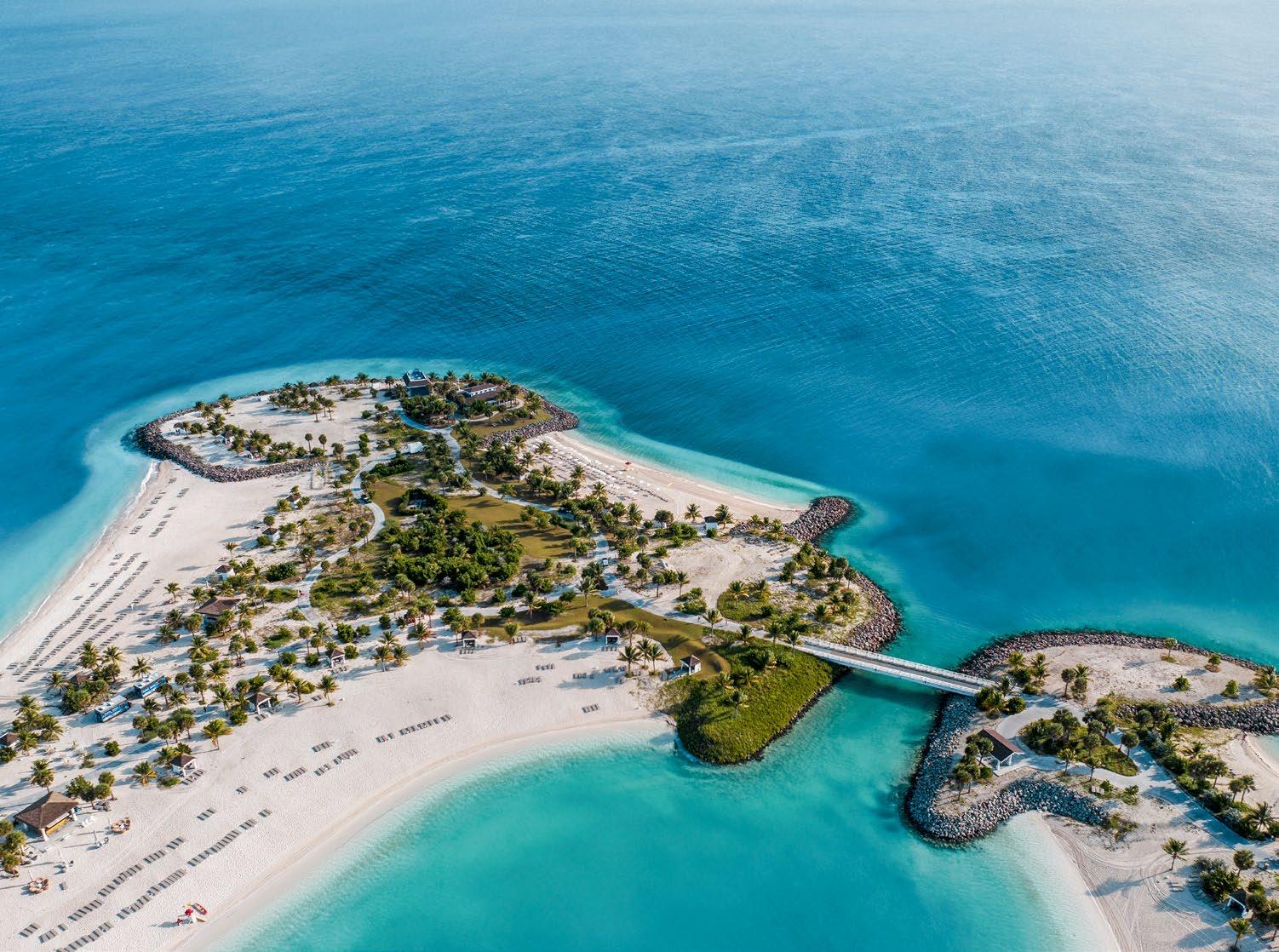
We have reaffirmed our commitment to achieving net-zero greenhouse gas emissions for our marine operations by 2050, supported by a robust energy transition plan. We leverage advanced onboard technologies and systems to prevent pollution, backed by the expertise of our teams both onboard and ashore. Our dedication to protecting marine biodiversity is demonstrated through initiatives including deck crew training in whale strike mitigation, underscoring our commitment to ocean health and reflecting our unwavering focus on environmental responsibility.
• Climate change
• Energy and fuel consumption
• Adapting to the effects of climate change
• ISO 14001-compliant
Environmental Policy
• Newbuild ship plan
• Energy transition plan
• On track to achieve the IMO carbon intensity reduction target by 2030, with 38.9% improvement since 2008
• 142 shore power connections in 2024, up from 44 in 2023
• Achieve net-zero greenhouse gas (GHG) emissions for marine operations by 2050, with interim absolute emissions goals set at five-year intervals
• Reduce carbon intensity by 40% by 2030 (from a 2008 baseline), aligned with the IMO targets
• A target of 250 shore power connections in 2025
The maritime industry must take action to tackle climate change; it threatens both the long-term viability of our business and the destinations we visit. We recognise our responsibility to take meaningful action as part of the sector’s role in the global transition to a low-carbon economy. Although shipping is recognised as a hard-toabate sector and may decarbonise at a slower pace than some other industries, it can still contribute meaningfully to global climate goals if other sectors achieve their expected rates of decarbonisation.
The key levers for change in our industry are developments in ship and engine technology, increasing operational efficiency and switching to renewable fuels.
In 2021, the Cruise Division committed to achieving net-zero greenhouse gas (GHG) emissions for its marine operations by 2050. This aligns with the climate ambition agreed by the Member States of the IMO and is compatible with the Paris Agreement goal of “holding the increase in the global average temperature to well below 2o Celsius above pre-industrial levels and pursuing efforts to limit the temperature increase to 1.5o Celsius above pre-industrial levels.”
Since setting our net-zero target, we have appointed a Chief Energy Transition Officer, significantly grown our Energy Efficiency Team, and have hired additional specialists. We have provided tailored training to individual business units and the global workforce, both ashore and onboard, and have made investments in the digital tools needed to monitor energy consumption and emissions performance.
As a result, awareness of climate-related impacts, risks and opportunities (IROs) has continued to grow across all business functions and management levels. With the introduction of the double materiality exercise, climaterelated IROs are reviewed across the business to ensure these remain relevant.
The Sustainability Advisory Board (SAB) is regularly updated on business performance relative to our climate targets.Any significant changes to our operating environment that affect material climate change IROs are presented to the SAB for their attention and guidance. Energy performance is directly linked to the remuneration of senior onboard roles as described in the Governance section.
Further reduction possible with regulatory clarity and
We are committed to pursuing a credible, robust and transparent energy transition plan on our path to 2050. The first iteration of this plan has been independently verified by Bureau Veritas and the verification process will continue every year from now on. The plan will be continually updated to reflect the real performance of our fleet, changes to our business strategy, material changes to key inputs like renewable fuel availability, and any emerging technologies that can help to accelerate the transition. Annual updates are reviewed and approved by the CEOs and the Executive Chairman and made public within each sustainability report.
In order for the transition plan to reflect the operational environment and strategic objectives of the business, and to support our decision-making processes, we have developed a comprehensive predictive model to monitor progress. This
provides Senior Management with access to on demand scenariobased decarbonisation forecasts. This capability means that the energy transition strategy is embedded in the business and financial planning of the Cruise Division.
Over the next five years, MSC Cruises will introduce five new World Class ships, alongside four additional Explora Journeys ships, increasing the total number of ships in the fleet from 24 in 2024 to 33 by 2030. The MSC Cruise Division will achieve peak emissions in 2030 (CO2-equivalent on a well-to-wake basis) and will then begin to reduce absolute emissions as we accelerate the fuel switch to renewable fuels, with a focus on deploying bioLNG where possible. We are confident in our ability to meet our stated targets in 2035, 2040, 2045 and ultimately 2050, but improved regulatory clarity coupled with increasing renewable fuel production would enable us to accelerate our transition.
To achieve our climate commitment, we are focusing our effort and resources on three main decarbonisation levers: ship and engine technology, operational efficiency, and renewable fuels.
Together, these three levers can reduce the energy demand of our fleet while also decreasing the well-to-wake GHG emissions generated from producing the energy we require. The Cruise Division is committed to allocating the financial resources required each year to achieve or exceed our targeted trajectory.
Our newbuild programme ensures that each new ship incorporates design features and technologies to reduce our energy demand. A single cruise ship can cost more than €1 billion and is expected to remain in service for over thirty years, so it is critically important that we design our ships for long-term resilience. We collaborate closely with our own naval architects, shipyards, research and development institutions, technology
providers, engine manufacturers, and numerous other stakeholders to deliver the most energy-efficient designs possible.
We have a detailed newbuild strategy that imposes clear requirements linked to energy efficiency, renewable fuel compatibility, and other technical design elements so that each new ship can support the energy transition and our net-zero ambition. For example, all newbuilds must be able to plug-in at berth and exceed the IMO’s Energy Efficiency Design Index (EEDI) Phase 3 requirements by at least 20%.
To measure the energy-efficiency performance of our newbuild programme, we rely on the EEDI, as the globally harmonised framework that drives progress on energy efficient ship design by imposing emission limits for new ships. We are proud that the Cruise Division’s newbuild programme has delivered some of the most efficient cruise ship designs entering service globally, far exceeding the most recent EEDI Phase 3 introduced in 2022.
EEDI Reference
EEDI Phase I
EEDI Phase II
EEDI Phase 3 & EEXI
› All newbuilds must be able to plug-in at berth and exceed the IMO’s EEDI Phase 3 requirements by at least 20%.
A critical consideration in new ship design is the ability to mitigate uncertainties related to future fuel availability. The engine technology installed on our ships must be sufficiently flexible to use the lowest impact fuels available today while also enabling a direct switch to renewable energy.
To support this transition, we are installing dual-fuel engine technology on all newbuilds, to operate on both liquified natural gas (LNG) and marine gas oil (MGO), which means that they can run on the broadest range of renewable drop-in fuels commonly available in the market today, from bioLNG to biodiesel. In addition, the tanks and piping systems installed onboard are designed for future compatibility with methanol, reducing the time and effort required for a potential retrofit if renewable methanol emerges as a commercially viable alternative in the future.
This strategy means that almost all renewable fuel pathways remain available to our fleet in the future and, most importantly, enables immediate use of renewable gas (such as bioLNG and synthetic LNG) which is increasingly viewed as one of the most cost-effective and scalable renewable fuel pathways in the short and medium term.
All our dual-fuel ships in service today run on LNG, providing an immediate GHG reduction of up to 20% compared to conventional marine fuels as well as virtually eliminating many local air quality pollutant emissions:
• ~85% reduction in nitrogen oxides (NOx)
• ~99% reduction in sulphur oxides (SOx)
• ~99% reduction in particulate matter emissions (PM)
A common and valid concern regarding LNG as a marine fuel is methane slip. LNG is primarily composed of methane, most of which is combusted in the energy conversion process, but a small fraction can escape due to incomplete combustion in the engine.
As concerns related to methane slip from engines using LNG are often based on outdated information that no longer reflects modern engine performance, we have sought to better understand the actual emissions performance of our modern engines. VTT, an independent research institution specialising in direct emissions measurements, received support from the European Union funded GREEN RAY1 consortium to conduct a series of onboard measurement campaigns on two of our LNG-fuelled ships, MSC World Europa and MSC Euribia, during real cruise
[1] www.greenray-project.eu
operations. VTT used advanced measurement techniques, including gas chromatography and Fourier-transform infrared spectroscopy to ensure precision, and measured emissions at different engine loads as well as during the dynamic engine conditions experienced during manoeuvring.
The study revealed that, for MSC World Europa and MSC Euribia, the weighted average methane slip value is 1.7%, considerably lower than the 3.1% default factor set by FuelEU Maritime (Regulation (EU) 2023/1805) for dual-fuel LNG medium-speed engines.
VTT found that methane slip is not only influenced by engine technology but also by operational practices – particularly engine load management – with methane emissions significantly decreasing as engine load increases. Actual operational data demonstrating that our ships operate at engine loads of 25% or less for less than 10% of the time, mainly during port manoeuvres due to safety reasons. For the remaining 90% of the time, the engine load of our vessels is generally above 40%.

› With either four or five engines per vessel, our crews can constantly optimise engine loads to maximise fuel efficiency and minimise methane slip.
With either four or five engines per vessel, our crews can constantly optimise engine loads to maximise fuel efficiency and minimise methane slip, adjusting the number of active engines as needed to keep engine loads high and maintain optimal performance.
These real-time monitoring results, along with comparisons to previous studies on older technologies, are detailed in the full report ‘Methane slip and other emissions from newbuild LNG engine under real-world operation of a state-of-the art cruise ship’.
Research & Development
We invest heavily in scouting and testing new technology
solutions that are emerging both within and outside of the maritime sector. Some of these technologies may only deliver incremental emissions reductions, while others may have the potential to entirely disrupt traditional approaches to the challenge of maritime decarbonisation.
The Cruise Division is actively involved in a variety of research and development initiatives together with industry partners, academic institutions and research institutions. In Europe, many of these initiatives are publicly funded by the European Union and address developments ranging from the marine applications of solid oxide fuel cells (SOFC) or novel onengine technologies, to a broad range of energy
technologies and digital solutions.
[2] N. Kuittinen, P. Koponen, H. Vesala, K. Lehtoranta, Methane slip and other emissions from newbuild LNG engines under real-world operation of a state-of-the art cruise ship, Atmospheric Environment: X, Volume 23, 2024, 100285, ISSN 2590-1621
MSC Cruises was a member of a three-year, EU-funded, joint-industry project on the decarbonisation of long-distance shipping known as Project CHEK 3 which reached its completion in 2024.
The large consortium brought together members including technology providers, ship owners, class societies and academia to develop and test various technologies – both onboard and in laboratories – that can reduce the GHG emissions of shipping.
One of our most modern ships, MSC Meraviglia, was taken as a reference, and this baseline data was used to evaluate the impact of various technology improvements.
One key outcome of the project was a digital cruise itinerary optimisation tool which is capable of planning, simulating, and evaluating scenarios that minimise environmental impact and maximise commercial performance. The system can be used to plan cruise itineraries several years before the cruise journey itself and, during various simulations, was able to propose routes that would improve energy performance by up to 15%. We intend to use this tool consistently for all itinerary planning at MSC Cruises and Explora Journeys.
[3] www.projectchek.eu
Operational efficiency
Designing and delivering the most advanced ships possible is the first step. The second is to ensure that they are operated in the most energy-efficient way possible.
Digitalisation
Advances in the digitalisation of onboard systems and innovative software solutions are driving efficiency gains by unlocking real-time, data-driven decision making. The efficiency gains that we have realised through digitalisation have been substantial and the ceiling for further gains is not yet realised. Two of the key solutions that are driving this shift are:
• OptiCruise
We developed this proprietary algorithm, based on the outcomes of Project CHEK, to optimise global itineraries and ship deployment. It develops appealing cruise itineraries while analysing historical data to adjust arrival and departure times, port sequences, and speed profiles to reduce fleet-wide energy consumption.
• Oceanly Performance
This software provides real-time monitoring of each ship’s performance by tracking fuel consumption, engine performance, hotel load, and all major onboard systems and utilities during each voyage. Every five minutes, thousands of signals are transmitted to our shoreside Energy Efficiency
Department who can advise the ship command on opportunities for further efficiency gains and to share best practices across the fleet.
We recognise that propulsion is by far the single most energy consuming function of our fleet, and have made significant investments to optimise propulsive performance, including:
• Enhanced drydocks with full hull blasting and application of premium paints, which reduce the roughness of the hull and slow the buildup of biofouling.
• Conducting condition-based underwater hull cleaning and propeller polishing operations.
• Managing ships’ loading (displacement and trim) to achieve maximum hydrodynamic efficiency.
• Retrofits to improve hull and propeller efficiency (such as propeller blade retrofit and ducktail installation).
Propulsion performance is measured using established industry guidance, including the speed loss as per ISO 19030 or the added power as per DNV-RP-0675. By applying these published methodologies, we have been tracking the performance of each individual ship and the fleetwide trend over time. This improved performance is illustrated in the fleet speed loss reduction chart, showcasing the continuous improvement that these measures have delivered.
Hotel and services
Hotel and service operations comprise a significant proportion of our energy consumption. We need energy for heating, ventilation and air conditioning (HVAC), galleys, laundry operations, lighting, as well as all auxiliary functions such as exhaust gas cleaning, freshwater production, and various pumps and fans. We have been implementing technical and operational measures to optimise hotel and service operations and to ensure that no energy is wasted, including:
• Installation of a chiller optimisation system which increases the efficiency of the HVAC system using artificial intelligence to analyse data from hundreds of sensors on board and optimise setpoints. We have retrofitted this on MSC Magnifica and, by the end of 2025, we will have retrofitted 11 additional ships.
• We have retrofitted the lighting on 14 of our older ships, exchanging florescent lighting for more energy efficient LED.
• Optimisation of freshwater production to maximise heat recovery from the engines.
• Optimisation of HVAC, pumps, and heat recovery setpoints.
• Enhanced crew training and coaching to raise awareness of how our behaviours can improve energy efficiency.
• Energy audits to assess discrepancies of real operational performance versus the targets of the original ship design.
Digitalisation plays a key role in storing and analysing operational data to obtain insights into how we are consuming energy in our hotel and service departments. It enables us to focus on key consumers, identify optimal operational practices, and to quantify savings after we have applied a new measure.
Power systems
By maximising the efficiency of our ships’ power systems, we reduce the amount of fuel we require. Activities include:
• Optimising the configuration of the diesel generators, to maximise the efficiency of each unit.
• Monitoring engine operational parameters, such as specific fuel oil consumption, to obtain data-based insight on the condition of the engines.
• Maximising heat recovery from the exhaust gases, reducing the need for auxiliary boiler operation.
› We are using digital monitoring to reduce speed loss and improve the propulsion performance of our fleet.
Operational data received through our performance system is crucial not only for analysing and monitoring performance, but also for the development of digital twins of the ships’ energy systems, which serve as valuble tools to simulate scenarios, predict consumption and emissions, and ultimately identify optimal operational practices.
The impact of all the energy efficiency measures that we adopted in 2024 is a reduction of approximately 16,000 tonnes in fuel consumption (fuel oil equivalent) and a 50,000 tonnes reduction in tank-to-wake CO2 emissions.
Shore power sits at the intersection of ship technology and operational efficiency. Connecting directly to power sources ashore allows ship engines to be switched off, eliminating all direct emissions and dramatically reducing local air quality impacts. It also reduces the need to rely on more expensive renewable fuels while in port – with hotel load in port representing over 10% of total fleet energy demand.
Information on the growth of our shore power connections, as the capability is established at ports we visit, can be found in the Environment chapter.
Shore power is an important element of our strategy to reduce emissions. In 2024, 8,267 MWh of energy was consumed from shore power over 142 port calls, reducing direct GHG emissions as well as local air emissions from our vessels during this period.
While technology and operational efficiency can help to reduce the amount of fuel consumed by the fleet, switching away from fossil fuels to renewable drop-in substitutes is the only way to achieve sustained emissions reductions. Renewable fuel will play a critical role in achieving the ambitious decarbonisation objectives that we share with our peers in the global maritime industry. Unlocking the full near-term potential of renewable fuels requires three factors:
(1) Stable policy and regulatory measures that can de-risk investments in production capacity and renewable fuel offtakes.
(2) Effective public and private financing measures.
(3) Incentives to strengthen demand.
The European Union, through the EU ETS and FuelEU Maritime, and supported by the broader European regulatory framework (e.g. EU 2018/2011, EU 2024/1788, etc.), has
successfully introduced clear policy measures that help to provide the level playing field required to accelerate the energy transition in maritime transport. Attention must now turn to effective financing measures and incentive schemes that will further enable both end-users and fuel producers to address the price gap between fossil and renewable fuels.
In the interim, we are actively engaging with – and establishing partnerships with – renewable fuel producers and project developers to pursue long-term offtake agreements that can help to unlock the substantial investments needed to increase the supply of sustainable renewable fuels. In 2023, we proved that a fully net-zero GHG emissions cruise is possible with the right fuel using technology available today, when MSC Euribia achieved the industry’s first net-zero cruise using high-quality bioLNG. With the entry in force of FuelEU Maritime in 2025, we will begin using increasing amounts of renewable fuel.
2025 will also represent an important milestone as the negotiations at IMO on how to operationalise the revised 2023 IMO climate ambition to achieve net-zero by 2050 are expected to reach an initial consensus. The expected introduction of a global fuel standard will help to support increasing availability of commercially viable renewable fuels.
We have reduced the carbon intensity of our business significantly: the kilograms of CO2 emitted per ALB kilometre has dropped 38.9% since the baseline year of 2008. We achieved a year-on-year decrease of 1.8% in 2024 and expect to exceed the IMO’s target of 40% ahead of the 2030 target.
• Air pollution
• Water pollution
• Onboard resources and waste
• Biodiversity
• ISO 14001:2015 compliant Environment Policy
• All onboard standard operating procedures include an overarching policy statement
• A total of 17 ships, covering 81% of guest capacity had shore power capability by the end of 2024
• We connected to shore power in four more ports during 2024, taking the total to 12. Collectively, our ships made 142 connections at these ports in 2024
• With the introduction of Explora II, 16 of our ships, covering 79% of fleet capacity, incorporate Advanced Wastewater Treatment Systems
• A target of 250 shore power connections in 2025
• 19 out of 25 ships with shore power capability by the end of 2025
Our material issues
Pollution prevention is a critical topic for our industry, despite the strict regulations that govern the sector. Pollution caused by the operation of our cruise ships has the potential to negatively impact ocean, air and local soil quality, as well as the ports and destinations we visit.
Common pollutants affecting local air quality include sulphur oxides (SOx), nitrogen oxides (NOx), and particulates (PM) coming from the combustion of fossil fuels used by vessels. Poor air quality, in turn, may affect people’s respiratory health as well as local ecosystems. Uncontrolled, these emissions could influence the acceptability of cruise lines in port destinations, which could lead to barriers to access and operations.
Ocean pollution can result from wastewater discharged from ships, including from hotel operations, exhaust gas cleaning systems and – rarely – accidents such as oil spills. These pollutants have the potential to affect marine life, ocean ecosystems, and coastal areas, consequently impacting local communities and people’s livelihoods.
Our approach
As per all our fleet’s day-to-day operations, our governance
approach to prevent pollution is strictly controlled by our comprehensive environmental management system, which complies with both ISO 14001:2015 Environmental Management Systems and ISO 21070:2017 Ships and marine technology — Marine environment protection — Management and handling of shipboard garbage, as well as all regulatory obligations.
Full implementation of pollution prevention procedures ensure all our ships are fully compliant with the requirements of the International Convention for the Prevention of Pollution from Ships (MARPOL) which incorporates all types of pollution prevention, including oil spills, sewage and wastewater, solid waste management and air pollution.
All operating procedures– including those to prevent pollution or accidental spillages, and how to act if this happens – are subject to third-party verification.
All ships are equipped with approved wastewater treatment systems and controlled wastewater discharge mechanisms, with 16 ships utilising Advanced Wastewater Treatment Systems (AWTS). The total volume of black and greywater treated using AWTS increased from 3.5 million cubic meters
in 2023 to 4.5 million cubic meters in 2024. Additionally, four ships now feature enhanced nitrogen and phosphorus removal systems to meet the highest MARPOL ‘Baltic Standard’ for safe discharge of treated wastewater into sensitive areas.
We adhere to all regulations governing water discharge at sea. Our vessels are equipped with onboard Ocean Guardian software, which ensures compliance with the appropriate regulations for each geographic area.
Oily bilge water, which typically accumulates at the lowest point of a ship’s hull in the machinery spaces is normally disposed of at approved port facilities. This water is only discharged from the ship in exceptional circumstances and always following required treatment protocols.
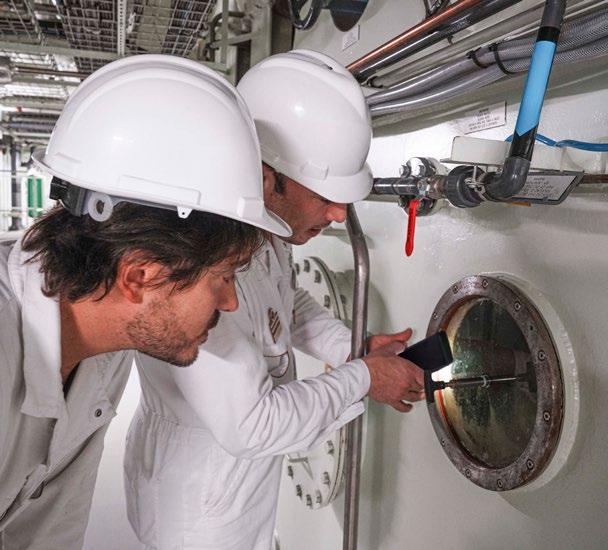
6,624,183 m3 TOTAL WASTEWATER DISCHARGED TO SEA

Biofouling
Each vessel operates under a Biofouling Management Plan that specifies monitoring and maintenance requirements and mandates the use of approved anti-fouling paints. The coating on the hull of all our ships complies with the International Convention on the Control of Harmful Anti-fouling Systems (AFS Convention). Eight ships are coated with advanced paints that are significantly more durable than conventional options, reducing the likelihood of flaking into the water.
Air
All ships use low sulphur fuels, including Marine Gas Oil and LNG, or else deploy exhaust gas cleaning systems (EGCS) approved by the Flag Administration in compliance with IMO 2021 Guidelines for Exhaust Gas Cleaning Systems (MEPC.340(77). The EGCS removes the majority of SOx emissions before release, reducing sulphur contents from the exhaust below 0.1%. The washwater from this process is discharged in accordance with applicable international
Shore power plays a very important role in managing the potential impact of local air emissions in the ports and destinations into which we operate. Connecting our vessels directly to power sources ashore allows ship engines to be switched off in port, eliminating all direct emissions and dramatically reducing local air quality impacts. This also reduces the need to rely on more expensive and less available renewable fuels, with hotel load in port representing up to 10% of total fleet energy demand. We have fitted shore power capability as standard on all our new ships since 2017 and are working to retrofit the rest of our fleet. We intend to retrofit two more vessels by the end of 2025, so that the MSC Cruise Division will have a total of 19 out of 25 ships equipped with shore power capability.
2023 was the first year our fleet started to regularly connect to shore power with 44 total connections in 8 ports, rising to 142 connections in 12 ports in 2024. Our target for 2025 is to achieve 250 connections.
ALESUND, NORWAY
BERGEN, NORWAY
HAUGESUND, NORWAY
KRISTIANSAND, NORWAY
KIEL, GERMANY
HAMBURG, GERMANY
WARNERMUNDE, GERMANY
SOUTHAMPTON, UK
SHANGHAI, CHINA
LOS ANGELES, USA
SHEKOU, CHINA
VALLETTA, MALTA
regulations. Our vessels are fitted with hybrid ECGS systems which allow washwater to be held in tanks onboard whenever direct discharge is not permitted.
Selective Catalytic Reduction (SCR) equipment is fitted on our newest ships which reduce exhaust NOx emissions to achieve Tier 3 emissions levels.
In addition, we voluntarily adhere to “Blue Flag” agreements with several Italian ports, and to the Charter on Sustainable Cruising in the French Mediterranean, implementing various environmental protection measures well beyond national and international regulations to minimise the potential environmental impact of our vessels in and around ports.
An important way to minimise the risk of pollution incidents is through a comprehensive programme of mandatory training
for our crew. This includes procedures that must be followed during activities such as fuel bunkering, or how to safely handle an incident to minimise any potential impact. Anyone handling waste streams receives clear instructions on their duties and the safe use of waste handling equipment.
Four times a year , we provide advanced regulatory-focused training designed for senior crew directly involved with the shipboard environmental management programme.
Onboard environmental committee meetings, convening officers and crew from all departments, regularly review methods to improve environmental performance and practices.
We deploy different means to help raise passenger awareness, including environmental information and signage in passenger areas, videos on cabin TVs, and presentations.
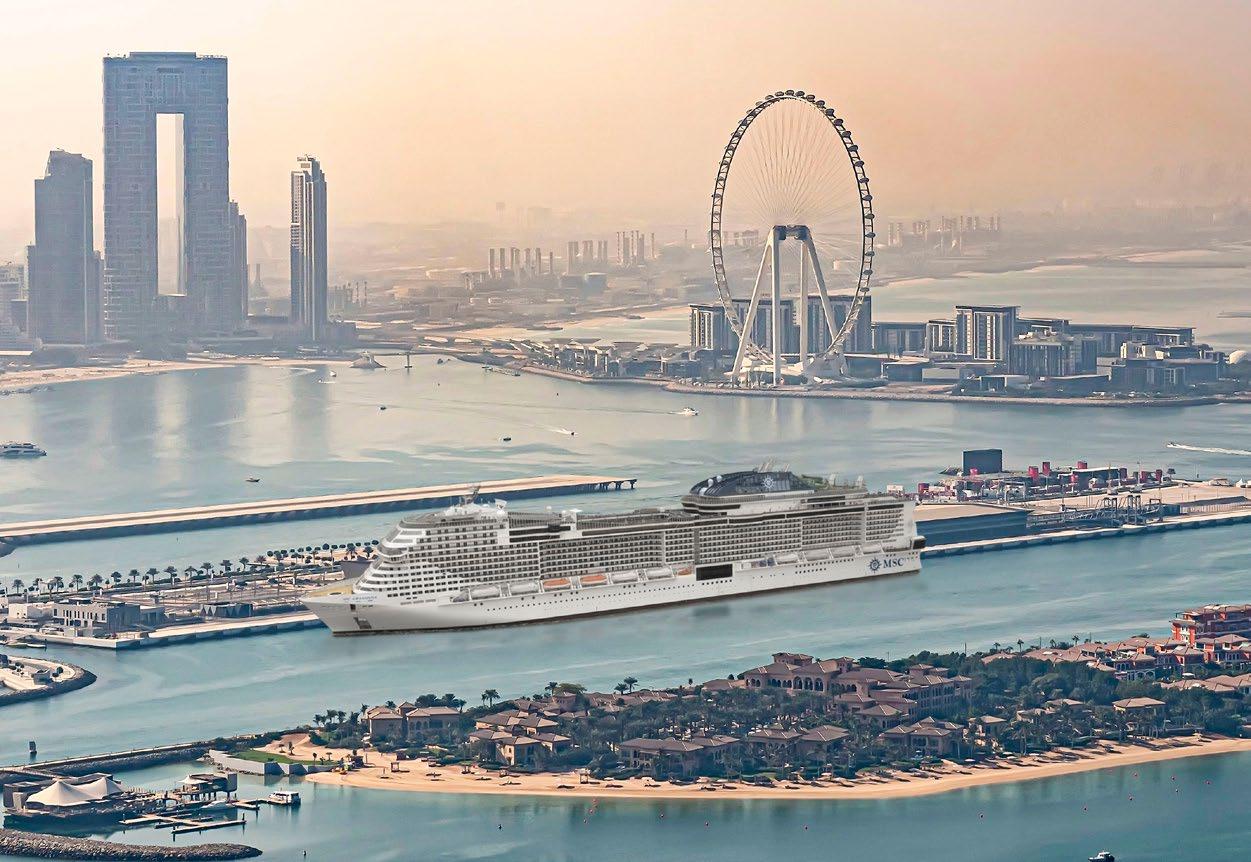
› Material issues
• Water consumption
• Onboard resources and waste
› Our related policies
• ISO 14001:2015 compliant Environment Policy
› 2024 Highlights
• 87% of all potable water across our fleet is produced by onboard desalination
› Looking ahead and targets
• Continue to take action to avoid bunkering of freshwater in water-scarce regions
Our material issues
Onboard our ships, our guests and our crew use freshwater for personal hygiene, drinking, cooking, laundry, and leisure facilities. We also need freshwater for cleaning and for some technical operations. With freshwater scarcity intensifying as climate change disrupts weather patterns, water security and availability is under threat in many geographies, including places that our cruise ships visit. In these water-stressed regions, any cruise ship bunkering water (taking water supplies from onshore) can worsen local shortages.
Our approach
We aim to maximise the amount of freshwater we produce onboard, primarily associated with hotel operations and technical operations and minimise the amount we take from shore. All our ships use desalination treatment technologies, like reverse osmosis or evaporators, to convert millions of litres of seawater into freshwater every day, supplying 87% of the freshwater consumed onboard our fleet.
If we are visiting a water-scarce region or port, there are clear instructions not to bunker water, as made known by the port authorities, or only in exceptional and unavoidable circumstances.
Investing in water-saving technologies and practicing good stewardship helps us to reduce our overall water demand.
Water conservation
Onboard water recovery processes help reclaim and reuse water for non-potable purposes, including reusing filtered laundry water and air-conditioning condensate for toilet-flushing, laundry, and deck washing.
We use water-saving devices, such as low-flow taps, vacuum systems for toilets and food-waste transportation, and efficient laundry and galley equipment.

We educate our crews on the value of freshwater and train them to conserve it wherever possible – from turning off taps when not in use, to only using necessary quantities for cleaning and reporting leaks. This has helped with our overall reduction of water consumption per guest day across the fleet.
performance
The total water demand has increased as we increase our ships in operation and the number of guests carried. The demand per guest day has remained consistent over the last two years as 0.26 m3 per day.
In 2024 the amount of water produced onboard from seawater was 87% with the remaining amount bunkered from shore, a ratio that has also remained similar to previous years.
7,998,200 m3
TOTAL WATER DEMAND ONBOARD
› Material issues
• Biodiversity
• Air pollution
• Water pollution
› Our related policies
• ISO 14001:2015 – compliant Environment Policy
Our material issues
Cruise operations can pose significant risks to ocean biodiversity – already threatened due to pollution, habitat loss and climate change. Underwater noise from ships can disrupt marine life, while ballast water discharge and hull biofouling risk the introduction of non-native species, jeopardising native ecosystems. Ships can strike large marine mammals such as whales. Onshore activities, including port and terminal infrastructure development and tourist excursions, can degrade or pollute habitats and disrupt wildlife, further threatening the ecological balance.
Our approach
Biodiversity is essential to healthy ecosystems, and as a business fully dependent on the oceans, we have a responsibility to minimise our impact. By taking guests to see some of the world’s most beautiful natural destinations, it is vital that we play our part to preserve thriving fauna, flora and ecosystems which not only support the planet, but enhance the ongoing appeal of our cruise itineraries and brand value.
By prioritising biodiversity protection through strategies which aim to preserve ocean health, protect marine life, reduce impacts of construction on the environment, and support education, conservation and restoration, we are working to actively mitigate our impact. This not only helps ensure compliance
› 2024 Highlights
• 469 crew completed vessel strike mitigation training by end of 2024
• Trial of ORCA AI mammal detection system on Explora I
› Looking ahead and targets
• Implement a new Biodiversity Policy and action plan in 2025
• Deliver vessel strike mitigation refresher training to all deck crew in 2025 to protect marine life

with environmental standards but enables us to play a role as an active steward of the ocean. Our approach is to ensure that biodiversity considerations are embedded in corporate decision-making and actions approved by our Sustainability Advisory Board.
All wastewater from our operations is discharged in full compliance with the rigorous standards set by MARPOL and the Ballast Water Management Convention (BWMC).
Ballast water, carried in a ship’s ballast tanks to improve stability, balance and structural integrity, could lead to the spread of invasive species and its discharge is strictly controlled. A Ballast Water Management Plan is developed for each ship in accordance with the BWMC. Accordingly, ballast water is treated onboard before discharge to prevent the spread of potentially harmful aquatic organisms from one region to another.
Our biofouling management plans are integral to our approach to managing potential impacts on marine habitats. These plans encompass regular hull maintenance and the application of appropriate anti-fouling paints, supported by routine inspections and efficiency monitoring, all aimed at minimising pollution and the risks associated with invasive species.
This commitment also extends to our comprehensive pollution mitigation measures. These include rolling out operational efficiency measures across the fleet alongside a strategic transition from conventional marine fuels to LNG-powered ships. This shift reduces greenhouse gas emissions and local air pollutants and the risk of oil spills. We also maintain stringent onboard protocols to prevent marine littering and to address oil spill risks effectively.
For a detailed exploration of our efforts to combat ocean pollution, refer to the section on Pollution.
Our new ships are designed with noise and vibration reduction features for guest comfort and to safeguard marine wildlife. All Explora Journeys ships and the latest MSC Cruises vessels have received underwater radiated noise class notations, meaning that they conform to quantified underwater noise and vibration limits. This certification will be sought for all future ships.
We have several measures in place to reduce the risk of mammal disturbance and incidents of ship strikes, including restricting the speed of our vessels in areas identified to us as areas of particular risk of whale strike and as part of specific voluntary commitments.
As part of our commitment to the Charter on Sustainable Cruising in the French Mediterranean, we will deploy slower speeds in the event of whale sightings and report them to coastal authorities. Working with nonprofit organisations, including the International Fund for Animal Welfare (IFAW) and WWF Greece, we now avoid parts of the Hellenic trench area in the eastern Mediterranean to reduce the risk of disturbance to sperm whales in the region.
Since 2023, we have partnered with marine conservation charity ORCA to deliver comprehensive ship strike mitigation training for deck officers to reduce the likelihood of collisions with whales, dolphins, and porpoises. Refer to the following page for more details on this.
In 2024, we began investigating maritime detection technologies and our Explora I vessel was fitted with the ORCA AI system, capable of detecting and making crew aware of objects at sea, especially at night. This is being developed and refined as a useful tool to detect whale movement, allowing crew to make informed decisions on avoidance actions.
We are aware of the threat facing large whales from ship strike, which is impacting the recovery of many species driven to the brink of extinction by factors including commercial whaling. We believe that by training and educating our crew and removing the stigma around these accidental collisions, we can find impactful and effective solutions.
In 2023, we engaged with ORCA, the leading marine conservation organisation, to help train our crew. By the end of 2024, 469 crew members were trained across the entire fleet – over 1,700 hours of training time.
The training incorporates:
• Understanding ship strike and how it affects large whales
• The species of whales at risk and how to identify them
• Best practices for reducing the risk of ship strike
• High-risk areas and measures in place to protect whales in these areas
• What crew should do if there is a strike incident and how to report it.
This is a long-term partnership with ORCA and, in 2025, officer training will move to ORCA’s new e-learning platform. Officers who completed training in 2023 will start refresher training in 2025 to keep them up to speed with the latest developments in ship strike mitigation.

We funded the rehabilitation of the Ocean Cay MSC Marine Reserve, now a private island destination for our guests to enjoy. This involved the extensive clean-up of a once industrial site. It has since been developed in a way that enhances its natural beauty and enables marine wildlife to thrive, adhering to strict environmental and social management requirements, and annual independent audits. It was subsequently designated a Hope Spot by the non-profit organisation Mission Blue.
As part of our commitment to support responsible tourism, we work with local tour operations, and other destination and community groups, to identify tours and experiences that provide educational value relating to habitat protection. See our Affected Communities section for more details.
Any new port or coastal development related to our business, including the construction of terminals, must comply with any required local regulations which relate to habitat protection. For example, the construction of the MSC Miami cruise terminal, which started in 2022, followed strict monitoring obligations for biodiversity protection. The Biodiversity Management Plan incorporated procedures for stormwater management, pollution prevention, dust control and turbidity monitoring. It also included measures to protect and monitor manatees,
dolphins and sea turtles near the construction site. A full-time marine mammal expert was on-site during marine works to monitor surrounding water and record any mammal sightings. For any sightings within 50 feet of construction, all marine activities were halted until the area was clear.
• Seven ships with certified underwater radiated noise notation
• 469 crew members trained on whale-strike avoidance since 2023
Building on the success of our 2023 engagement with the World Shipping Council at the International Whale Protection Workshop, we attended a second collaborative event in 2024, organised by IFAW and hosted by MSC. It brought together representatives from the shipping industry and policymakers from Europe and beyond to share knowledge and explore solutions focused on noise reduction from vessels and ship strike avoidance.
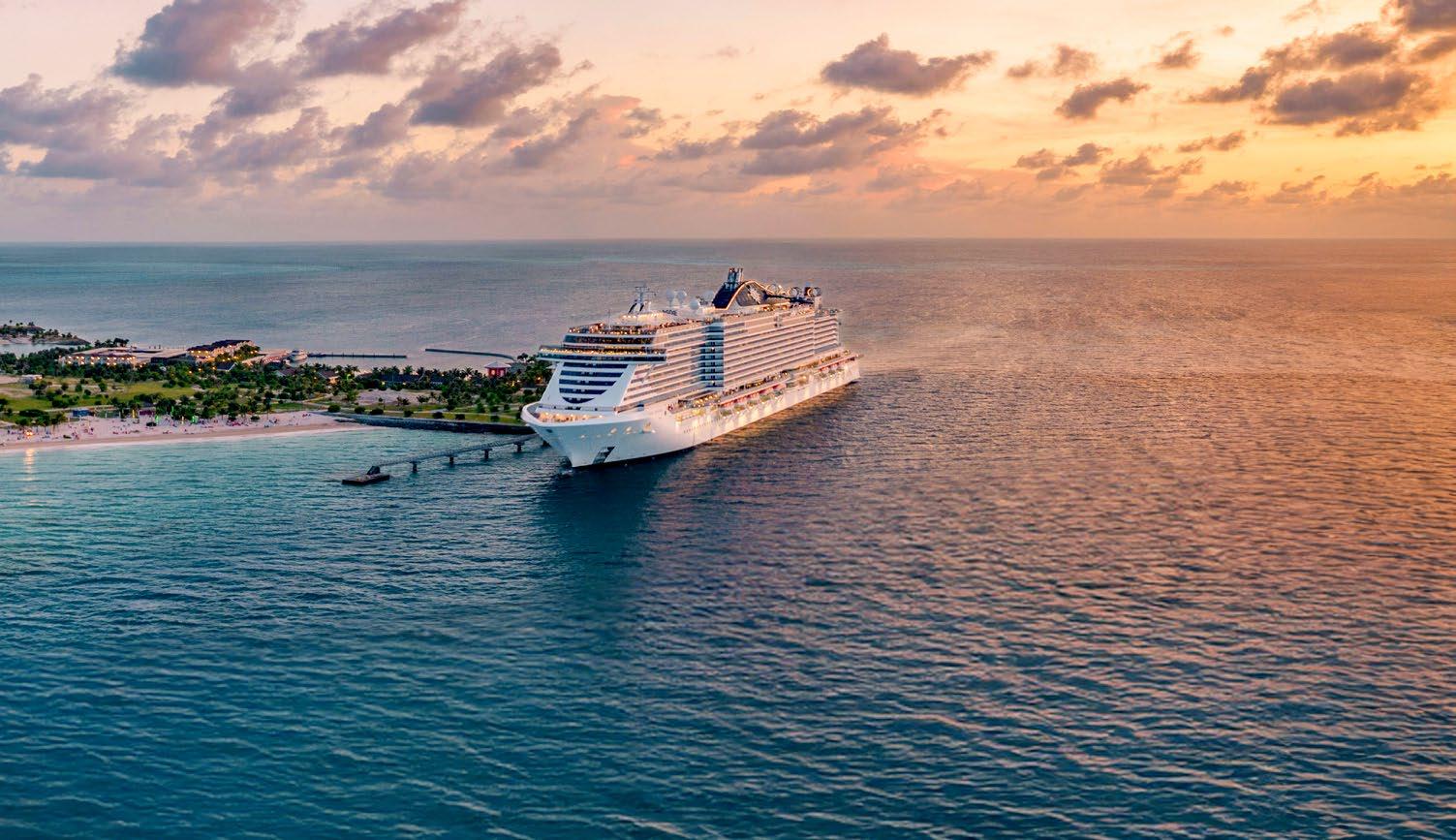
› Material issues
• Onboard resources and waste
• Climate change
• Biodiversity
› Our related policies
• Procurement Policy and Bidding Procedure
• ISO 14001:2015 -compliant Environmental Policy
› 2024 Highlights
• Over 40% of waste materials are segregated onboard to facilitate recycling
• New Procurement and Bidding Policy approved, with environmental guidelines for buyers
• Commenced the assessment of suppliers using the Ecovadis tool
› Looking ahead and targets
• Pilot an onboard food waste monitoring and measurement system in 2025 to reduce waste
• Maintain a waste recycling ratio above 40% onboard and explore alternative packaging solutions to further reduce onboard plastics
Our material issues
Every year we procure a huge range of items for our operations, ranging from ship maintenance materials to onboard food and drink, furniture, hotel operation items and crew uniforms. The production of all these goods can come with associated social and environmental impacts – such as worker welfare, deforestation, habitat loss, and biodiversity decline.
Waste generation is another key challenge, with significant volumes produced onboard during operations but also during ship construction. If not properly handled, waste can lead to marine pollution, ecosystem damage, as well as increased soil and groundwater pollution from landfills and incineration emissions.
Our approach
We are committed to responsible sourcing, resource use, and waste management to help minimise our environmental and climate impact and to operate efficiently. We apply a waste hierarchy lens to our operations, aiming first to prevent or reduce, then to reuse or recycle, before responsible disposal. We aim to take a more circular approach to resource use, working with suppliers and partners to find innovative solutions to some of our operational challenges. Our Procurement teams strive to ensure goods and services meet our health, safety, ethical, and environmental standards.
Each ship operates under a comprehensive waste management plan that meets IMO MARPOL Annex V standards, to ensure
efficient waste collection, minimisation, separation, and processing onboard, with careful disposal at approved shoreside facilities. Our aim is to reduce onboard waste, minimise food waste disposal at sea, and increase recycling rates.
We comply with EU Regulation 2022/91, which promotes waste reduction and sustainability through incentives like reduced port fees. Our fleet ISO 14001:1015 and ISO 21070:2017 certified management systems demonstrate our commitment to maximising recyclable waste segregation and responsible disposal across all our operations, onshore and at sea.
A new Procurement Policy and Bidding Procedure was implemented in December 2024, covering all purchases across MSC Cruises and Explora Journeys brands. This specifies that when buying products or services, our teams must take account of environmental aspects, including looking favourably on certified systems and products, as well as providing specific guidance on product credentials. As we mature our sustainable procurement systems, we are committed to developing product-specific actions and targets.
We use the EcoVadis platform to assess suppliers through key ESG criteria, including environmental impact, labour and human rights and ethics. This helps us identify risks and drive continuous improvement towards a more resilient and transparent supply chain.
decreasing the quantity of waste generated
using materials repeatedly
using materials to produce new items
recovering energy from waste
safe responsible disposal of waste in landfills
Beyond compliance, we seek opportunities for recycling with local partners. For example, in ports like Genoa, Venice, Trieste and Monfalcone, spent photographic solution is sent to recovery plants to extract silver. Used cooking oil from galleys is repurposed as biofuel for farming equipment in the USA, and we work with the MSC Foundation to identify charities to reuse obsolete furnishings.
Specific training is provided for all those onboard responsible for waste segregation and processing. This includes detailed instructions on their duties and responsibilities, as well as how to operate equipment and waste management systems.
Where possible, we look to reduce single use plastics. Many single use plastic items have already been eliminated from our ships and substituted with sustainable alternatives but we
are always looking at further improvements. For example, on our Explora Journeys ships, we serve water in refillable glass carafes, and guests are given aluminium water bottles to use at water fountains throughout the ship.
We made the commitment in 2024 to trial a food waste monitoring and measurement system onboard an MSC Cruises’ ship in 2025. The system enables all waste food to be measured and categorised by food type using food capture and weighing systems. This will allow accurate reporting on the value of the food waste generated throughout the ship and suggest actions to reduce this.
The pilot will be on MSC World Europa and, if it is successful, we will extend the implementation to five additional ships in 2025, and more thereafter.
Our performance
We segregate and process our waste into seven categories including recyclable streams including glass, aluminum and paper products and hazardous waste.
In 2024, we achieved a recycling rate of 41.5% of our total waste (excluding hazardous) – a similar proportion as we achieved in 2023.
Our Environmental Operations and Compliance Department ensure we are meeting all applicable environmental regulations and oversee the company’s environmental compliance strategy. They developed our Environmental Compliance Culture and Prevention (ECCP) concept to promote environmental awareness and compliance at all levels, encouraging our management to lead by example. The ECCP aims to ensure that everyone onboard works to protect the environment, prevent incidents, and eliminate near misses.
Environmental Compliance Officers (ECOs) are important members of the team, deployed on each vessel to:
• Oversee environmental training programmes for our crew
• Ensure compliance with environmental laws, policies and procedures
• Conduct regular audits and report nonconformities, working closely with travelling fleet supervisors and external auditors to verify that we meet regulations.
• Manage waste operations, supervising a team of specialist waste operators who carry out duties
Four travelling Fleet Environmental Supervisors visit ships regularly to provide training, evaluation, verification and quality control, supporting the onboard ECOs.
Through their continuous monitoring, training and policy updates, our ECOs are essential to help us operate responsibly and in full compliance with environmental regulations.

› 41.5% of waste materials were segregated for recycling.
WASTE PER GUEST DAY MSC Cruises fleet
Waste material (Excluding recyclables)
Recyclable material
1.17 kg guest/day
0.83 kg guest/day

LNG FUEL
LNG reduces greenhouse gas emissions by up to 20% and enables a direct transition towards drop-in renewable bio and synthetic LNG.
2/22 MSC CRUISES
SHORE POWER CONNECTIVITY
Enables engines to be switched off in port.
15/22 MSC CRUISES
2/2 EXPLORA JOURNEYS
SELECTIVE CATALYTIC REDUCTION SYSTEM
NO
Reduces NOx emissions.
6/22 MSC CRUISES
2/2 EXPLORA JOURNEYS
ANTI FOULING PAINTS
These paints slow growth of marine organisms, reducing drag and improving energy efficiency.
22/22 MSC CRUISES
2/2 EXPLORA JOURNEYS
ADVANCED WASTEWATER TREATMENT
Treats water to stringent international standards
AWTS:
14/22 MSC CRUISES
2/2 EXPLORA JOURNEYS
Baltic Standard:
4/22 MSC CRUISES
2/2 EXPLORA JOURNEYS
BALLAST WATER TREATMENT SYSTEM
UV treatment and filtration prevents transport of potentially invasive species between regions.
22/22 MSC CRUISES
2/2 EXPLORA JOURNEYS
UNDERWATER RADIATED NOISE CONTROL
Minimise noise or vibration that might impact aquatic mammals.
URN Notation:
5/22 MSC CRUISES
2/2 EXPLORA JOURNEYS
› 15 ships have advanced paints, with greater durability and reduced flaking.
HEAT RECOVERY
Automated energy recovery loops allow effective distribution of heat and cold around the ship.
22/22 MSC CRUISES
2/2 EXPLORA JOURNEYS
TRIM OPTIMISATION
Reduces fuel consumption.
22/22 MSC CRUISES
2/2 EXPLORA JOURNEYS
DESALINATION PLANT
Provides all onboard freshwater from seawater - up to 3 million litres daily.
22/22 MSC CRUISES
2/2 EXPLORA JOURNEYS
LED LIGHTING
Energy-saving lighting controlled by smart management systems.
22/22 MSC CRUISES
2/2 EXPLORA JOURNEYS
WASTE RECYCLING
Waste is separated into different categories and compacted to maximise recycling.
22/22 MSC CRUISES
2/2 EXPLORA JOURNEYS
› Energy efficiency measures across the fleet have helped us achieve a 38.9% improvement in carbon intensity since 2008.
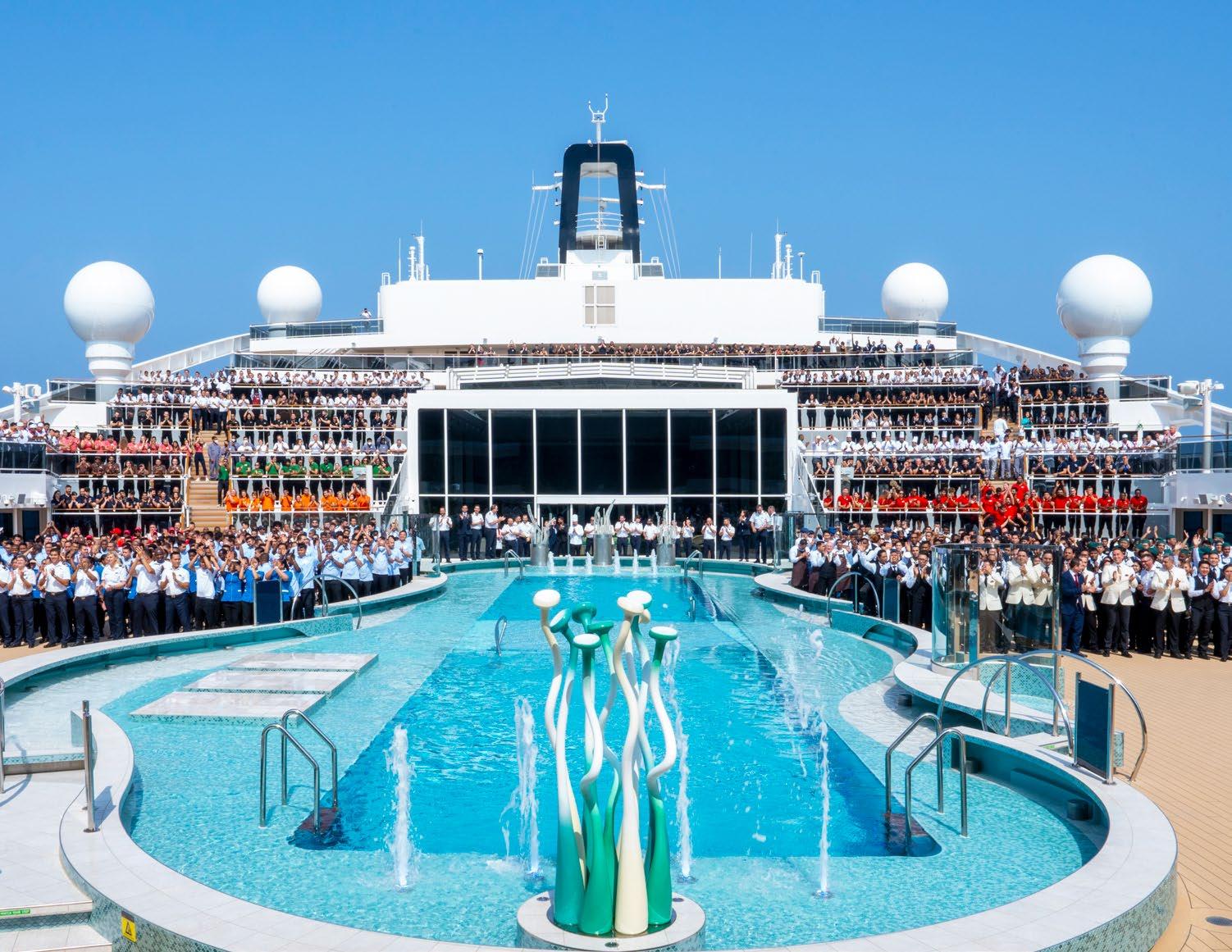
Our long-term success is closely intertwined with the wellbeing of our people, communities, and the environments we touch. Our commitment to fostering a skilled, diverse, and inclusive workforce is complemented by our dedication to ethical supply chain practices and the responsible growth of tourism. By addressing key social risks and advocating for human rights, we aim to create lasting value for our own people and those that we interact with.
• Employee health and safety
• Employee wellbeing
• Training and development
• Value chain workers
›
• Code of Business Conduct
• Global diversity and inclusion commitments
• ISO 45001:2018 - compliant safety management policy
• ISO 22001:2018 - compliant food safety policy
• Revision of Code of Business Conduct
• Introduced six D&I focused HR workforce management procedures
• Incorporated D&I training into the mandatory Code of Business Conduct training
• Improved retention rates for crew from 83% in 2023 to 89% in 2024
• Over 30 leadership development programs, and intensive leadership summits for senior onboard leaders in 2025
• Launch “Our Best,” a global cultural transformation initiative
• Align D&I practices fully with ISO 30415:2021, with third-party assurance
Our material issues
Our long-term success depends on our people. As the business landscape evolves, attracting, retaining and developing a skilled, diverse, and engaged workforce is essential to ensure our competitiveness, compliance, safety, and service quality.
Key social risks—including inadequate training, lack of diversity and inclusion, pay disparities, limited job security, and insufficient social protection—can undermine employee well-being, lead to higher turnover and disrupt operational continuity.
The safety of our crew and guests is at the heart of everything we do.
Health and safety incidents and challenges with employee retention can significantly affect our workforce and organisational stability. A safe and inclusive environment is critical to mitigating these risks and sustaining a workplace that supports long-term employee commitment.
We take a proactive approach to workforce management across both our onboard and shore-based teams, from recruitment to career development, aiming to ensure safe and healthy working conditions. Guided by our Code of Business Conduct and aligned with international conventions including the ILO Maritime Labour Convention (MLC), the IMO International Convention for the Safety of Life at Sea (SOLAS) and the IMO International Safety Management (ISM) Code, our internal procedures aim to support fair, inclusive and safe practices across our business.
Crew and guest security onboard is also guided by the International Ship and Port Facility Security (ISPS) Code, a globally recognised framework for ensuring maritime safety and security.
All employees must familiarise themselves with our Code of Conduct and are required to complete mandatory training to ensure their understanding. This covers all aspects of the actions and behaviours expected of employees and is supported by policies and procedures to ensure implementation.
As the business grows and adapts to new markets and regulations, attracting and retaining skilled employees remains a top priority. We invest significantly in continuous training, upskilling, and professional development - encouraging long term commitment to align with company culture and growth. New crew members follow structured skills training that includes preboarding (in dedicated facilities or online) and on-the-job development.
In 2024, we delivered three important training initiatives for our onboard leaders to support their development:
• Three Leadership Summits attended by 93 Captains, Chief Engineers, and Hotel Directors
• Navigating & Leading through Constant Change – 436 onboard leaders attended this three-day programme focused on unlocking leadership potential and managing teams effectively
• Learning Labs – tailored for Assistant Managers and Supervisors, these sessions emphasised operational learning in areas such as promoting psychological safety, and team empowerment, resulting in improved leadership and decision making
An Individual Performance Management System (IPM) is used company-wide to set objectives and evaluate performance.
It is mandatory for all onboard roles, with outcomes directly linked to career progression. As the company grows, employees then benefit from more opportunities for development and promotion.
We have dedicated crew training facilities for new crew hires in Honduras, Philippines, India, Indonesia and two in South Africa. In 2024, over 6,300 new hires were trained in these six facilities before embarkation.
Additional digital pre-boarding training is available on the e-learning app covering aspects such as health and safety, food safety, and business conduct, which must be completed as part of the onboarding process.
Our Code of Business Conduct is the foundation of numerous policies and procedures that aim to prevent discrimination, harassment, and other anti-social behaviours that impact the wellbeing of our workforce.
Recent initiatives have strengthened this commitment, with new policies promoting gender balance and cultural diversity.
Employee surveys allow us to track sentiment across key parameters. This includes the crew satisfaction survey which

identifies areas for improvement onboard our ships (and informs the bonuses of onboard management) and company-wide D&I surveys. These surveys have driven onboard improvements through the BETTER programme, with initiatives such as salary increases, laundry services for all crew, and more diverse meal options in the crew canteens.
In 2024, we introduced an updated and improved time and attendance system onboard that has improved the scheduling of crew work periods and allows more effective scheduling for time off during quieter periods. The system embeds the MLC compliance obligations relating to crew rest periods, ensuring that these rules are not compromised.
We also improved internal communication with the launch of a refreshed Intranet platform, guiding employees to information relating to work, career development and wellness. The e-learning hub provides extensive reading, listening and watching materials to support employees personally and professionally.
These changes contributed to the improvement in retention rates onboard from 83% in 2023 to 89% in 2024.
In 2025, a Live Well programme will be launched, providing practical resources and activities to support health and wellbeing of our workforce and designed based on feedback from the D&I survey.
D&I is a key focus area for us. It is important for attracting and retaining talent, while fostering a positive working culture. Building on the results from our first D&I survey in 2023, several priority initiatives were launched in 2024:
• New policy commitments:
- Global Talent Acquisition: embedding equal opportunities throughout hiring stages
- Learning, Development and Talent Management: ensuring inclusive professional growth pathways for employees onboard and ashore
- Workforce Planning: driving equitable staffing, resource allocation and future readiness
- Global Gender Identity Approach: fostering a workplace culture that affirms and respects all gender identities.
• A D&I Advisory Committee was established in 2024, with 13 global members (internal and external), meeting quarterly to guide strategy, monitor process and generate ideas.
• Mandatory D&I training for all employees aligned with the revised Code of Business Conduct.
• Awareness campaigns included D&I webinars for shore-based employees and featured at three Leadership Summits.
• Using the ISO 30415:2021 Human Resource Management: Diversity and Inclusion guidelines to inform our organisational culture, strategy and operations. Our aim is to fully align with these guidelines, with third party certification, in 2025.
“We believe we are the first in the industry to fully align our Communication, Marketing, Procurement, and HR practices with the ISO 30415:2021 standards. This alignment involves refining existing procedures to help us address biases, attract the right talent, and better align with societal expectations.”
Magali Bertolucci, Head of Diversity, Inclusion & Wellbeing
The minimum standards for working and living conditions for all seafarers is covered in the MLC. We strive to go beyond these.
All our crew are entitled to the right of collective bargaining, ensuring their voices are represented. The collective bargaining rights of shore-based employees are determined by the labour laws governing their respective jurisdictions.
Permanent contracts and job security boost employee satisfaction, reduce turnover, and support business continuity. For crew, we aim to issue appointment letters confirming their next start date and ship before disembarkation.
On our ships, we have transparent, gender-neutral salary bands that align pay with role and responsibility. A clear competency framework outlines the education, training, and experience required for each role, helping any crew member to pursue new opportunities within the company.
The Swiss Gender Equality Act requires companies with 100 or more employees to conduct wage equality analysis. In 2022, MSC Cruises undertook this gender pay analysis for our Swiss offices, which includes our head offices, with third party confirmation that there is no gender effect on the salaries received by our Swiss based employees. We will repeat this analysis in 2025.
All our shoreside offices adhere to health and safety regulations of the country they operate in to ensure optimal safe working conditions.
Onboard, we equip our crew with the knowledge and skills to identify hazards, operate equipment safely, and respond to emergencies. Safety measures include preboarding briefings, onboard drills, clear signage, and regular emergency procedures.
› Every action we take on board considers the health and safety of our guests and crew.
All crew receive extensive safety training covering induction, fire, man-overboard, abandon-ship drills, and role-specific training. Our Safety Management System complies with the ISM Code and ISO 45001:2018, which together ensure a comprehensive approach to managing safety risks and promoting a safe working environment. Third party checks by the class societies on behalf of the Flag states confirm alignment with the ISM Code and MLC standards.
We have a crisis response Care Team and comprehensive medical facilities onboard for use by both crew and guests. For more details on guest and crew medical care, refer to page 69.
Each month, senior leadership—including Board representation—reviews safety, medical, and security performance in Health, Environment, Safety, and Security meetings to guide operational decisions and improvements.
Food safety and public health are safeguarded through a comprehensive management system covering procurement, logistics, and onboard operations, aligned with and certified to ISO 22000: 2018 Food Safety Management.
In the supply chain, food suppliers are qualified and audited by the Quality & Compliance team to ensure compliance with strict food safety and quality standards. Onboard, Public Health Officers (PHOs) oversee daily food safety procedures—from storage to service—designed to prevent contamination, control infectious disease risks, and ensure regulatory compliance.
In 2024, 23 unannounced public health inspections were conducted across the fleet, with comprehensive onboard checks and scoring, all with positive outcomes.
ANVISA January Santos, Brazil ARMONIA Pass
ANVISA February Salvador GRANDIOSA Pass
ANVISA December Rio De Janeiro ORCHESTRA Pass
SHIPSAN September Venice ARMONIA A
SHIPSAN November Limassol LIRICA A
SHIPSAN July Piraeus OPERA A
SHIPSAN September Alicante ORCHESTRA A
SHIPSAN September Valencia SEASIDE A
SHIPSAN September Civitavecchia SEAVIEW A
SHIPSAN November Piraeus SINFONIA A
SHIPSAN October Cork VIRTUOSA A
SHIPSAN October Valletta WORLD EUROPA A
SHIPSAN September Kavala EXPLORA I A
SHIPSAN - A, B, C is a PASS. Below D is a FAIL VSP and PHAC - 86 and above is a PASS
› Material issues
• Guest health and safety
• Guest inclusivity and accessibility
› Our related policies
• Guest Conduct Policy
Our material issues
Every year, we carry millions of travellers from all walks of life to some of the world’s most sought-after and beautiful destinations. Keeping guests safe from accidents, crime or illness, making them feel welcome, and giving them a memorable and enjoyable experience are essential to our success.. As cruising continues to grow in popularity, there is an opportunity to promote responsible practices onboard, and offer a range of low-impact excursions.
Our approach
The safety of our guests onboard is our top priority. We maintain strict security protocols to address risks such as theft, drugrelated offences, and harassment. We aim to ensure the highest standards of food safety through rigorous checking measures to prevent illnesses and reinforce guest trust in the quality of our offerings.
We are equally dedicated to inclusivity. Our ships are designed to accommodate guests with reduced mobility and other disabilities, providing accessible facilities and services to support a seamless and comfortable journey.
Our guest conduct policy is made available to all future guests on our website and covers our expectations of our guests on issues relating to safety, security and behaviour towards the crew and other guests.
Guest safety
In 2024, we welcomed over 4.6 million guests onboard. On each journey, we implement robust measures to ensure their
› 2024 Highlights
• 4.6 million guests from 176 nationalities
• More than 25,000 pre-boarding accessibility requests accommodated
› Looking ahead and targets
• The Accessibility and Medical Form will be made digital in 2025, enhancing guest experience and improving global response times
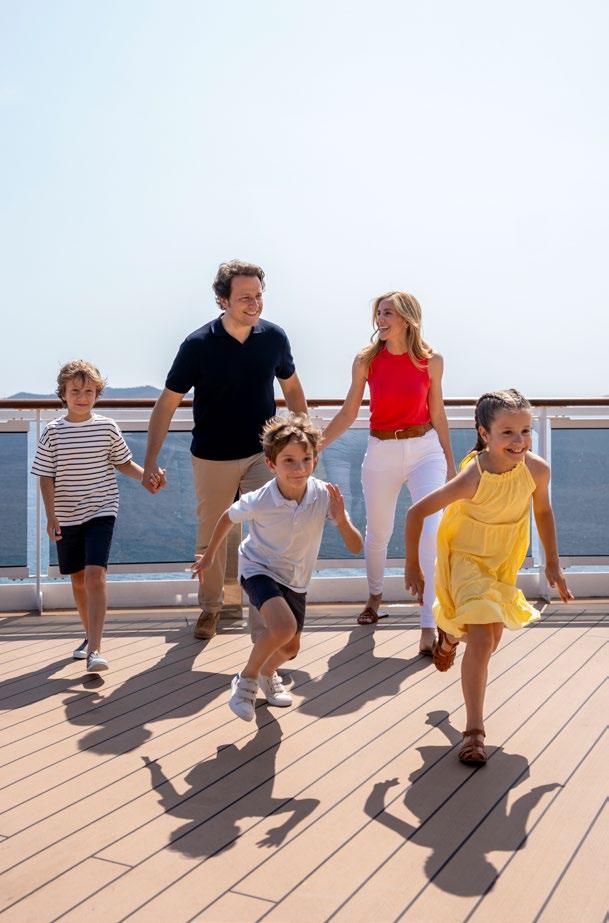
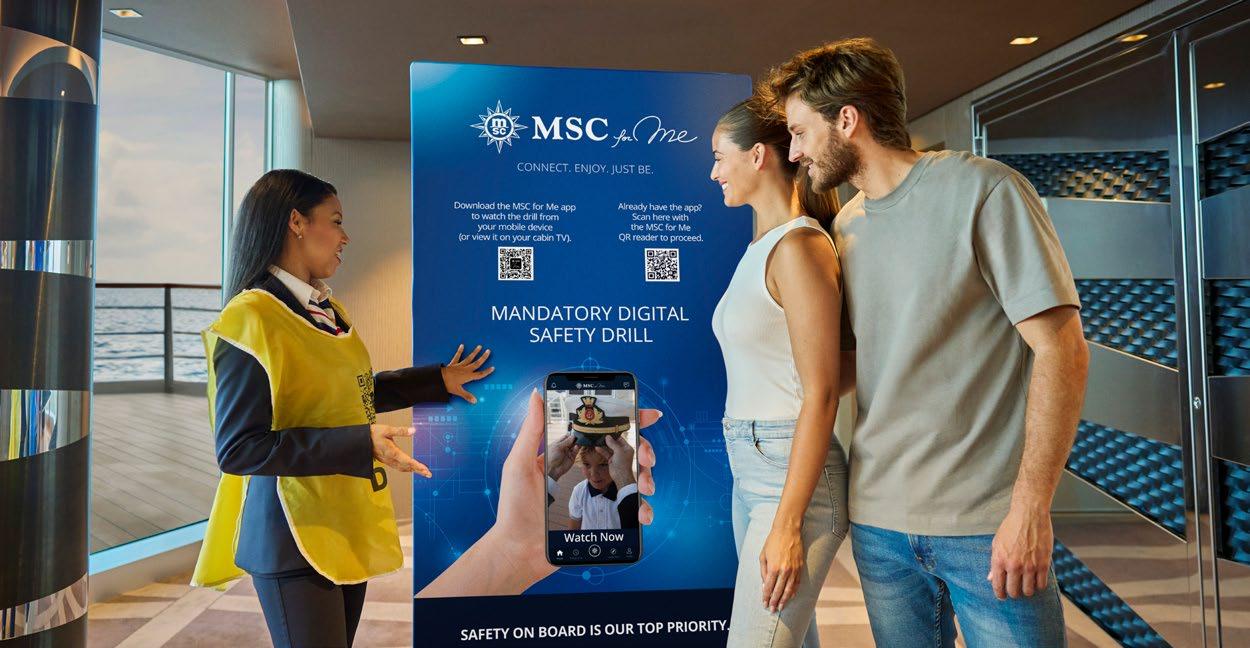
health, safety and wellbeing. When guests book excursions with us, we further protect their safety through comprehensive checks on third-party operators and by ensuring that any contractual agreements cover guest safety.
To be prepared for their onboard experience, all guests are required to watch a mandatory safety briefing via their in-cabin television, confirm completion, and participate in muster drills at their assigned station. All emergency procedures, guest communication, and safety signage across the fleet align with SOLAS requirements and are subject to rigorous independent checks. Our Maritime Support Center monitors vessel routing 24/7, providing continuous support to ships and contributing to the safety of our guests and crew.
Everyone onboard is protected by a comprehensive security system, including through the MSC Cruises Access Control Protocol, which requires proof of identity to access our vessels as well as security screening. All luggage must pass through screening at security checkpoints. Cabins are secured with locks and individually equipped with safe boxes for personal
belongings. Public areas are monitored by an advanced certified CCTV system, while trained Security Guards conduct continuous patrols and remain on emergency call 24/7.
Our onboard medical centres meet or exceed the CLIA-adopted ACEP healthcare guidelines for cruise ship medical facilities. Our full time doctors, nurses and paramedics are available 24/7 for emergency medical care and operate twice daily clinics for routine consultations.
Facilities on board include X-rays, cardiac monitoring, pulmonary ventilation, and various laboratory investigations, to assist with the diagnosis and treatment of patients. Onboard teams are supported by a dedicated 24/7 shoreside medical operations team of doctors and nurses. Patients requiring escalation of care or specialist medical resources are transferred to onshore medical facilities.
The ships follow rigorous public health communicable illness, outbreak prevention and food safety protocols in which are subject to regular inspections by global public health authorities.
Comprehensive food safety regimes are in place, from supplier to plate, certified to ISO 2200 Food Safety Management standard. More information on this and public health can be found on page 66.
Shore-based care specialists provide logistical and emotional support for both crew and guests affected by incidents occurring onboard or ashore. Two fully trained team leaders and nine specialists ensure that compassionate and timely support is provided around the clock.

Following a relaunch of the recruitment for onboard care team volunteers, we proudly welcomed 723 volunteers across MSC Cruises and Explora Journeys, who will undergo extensive training, assisted by a comprehensive e-learning programme launching in early 2025.
The Guest Safeguarding Policy was finalised in 2024, confirming our commitment and approach to supporting guests through sensitive incidents. This is supported by robust training for selected senior leaders onboard, to equip them with the tools
and techniques necessary to handle safeguarding cases with sensitivity and professionalism.
In 2024, over 25,000 pre-boarding accessibility requests were made by guests—an increase of 20% compared with 2023.
We introduced a new Accessibility and Medical Form in 2024, expanding our accessibility categories from 13 to 50. This now allows for more specific support across mobility, respiratory, cognitive and dietary needs and helps us better understand and accommodate our guests. We also delivered live online training sessions across all global contact centres to help guide guests through the new support categories.
Onboard, all ships feature accessible cabins, public areas and tenders (boats used to transport guests from shore to ship) in full compliance with IMO guidelines on accessibility for persons with restricted mobility. Detailed information on accessibility services, request procedures, and frequently asked questions are available the MSC Cruises website.
Guests can raise concerns through multiple channels, including a post-cruise satisfaction survey provided to all travellers. If issues are reported before or during the cruise, guests may also be invited to complete a mid-cruise survey to track resolution.
Onboard, all complaints are logged in a service-request database and assigned to the appropriate personnel for followup. After the cruise, concerns can also be submitted via booking agents or directly through our contact centres, with each case recorded and addressed accordingly.
› Our more comprehensive Accessibility and Medical Form allows us to provide specific support across mobility, respiratory, cogitative and dietary needs.
› Material issues
• Welfare of value chain workers
› Our related policies
• Business Partner Code of Conduct
• Slavery and Human Trafficking Statement
Workers can be exploited in a range of ways that undermine their human rights. Issues include human trafficking and slavery, forced labour and child labour.
We procure goods and services from a wide range of suppliers around the world. We aim to use our purchasing power as a force for good and it is therefore incumbent upon us to insist on high standards from our suppliers, and to conduct checks to confirm that these standards are being met.
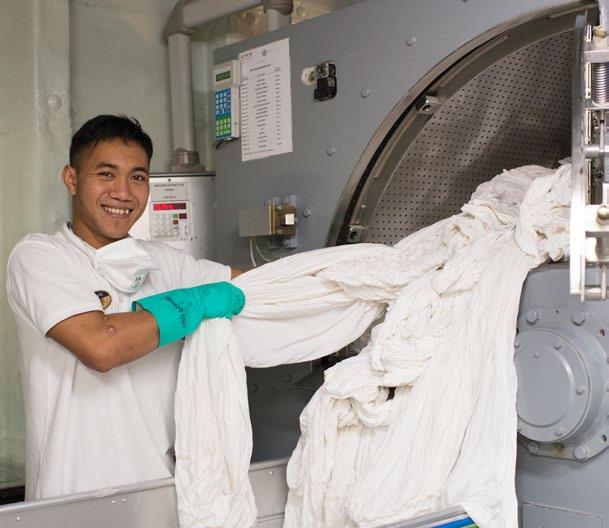
› 2024 Highlights
• Launch of the supplier risk assessment using EcoVadis
› Looking ahead and targets
• Complete assessment of over 200 most high-risk suppliers, assessed through EcoVadis and instigate improvement plans
We aim to provide safe and ethical working conditions across our value chain, with zero tolerance for human trafficking and slavery, forced labour or child labour. These standards are outlined in our Business Partners’ Code of Conduct, which mirrors our own Code of Business Conduct.
All contractors, subcontractors, suppliers, partners, and others with whom we do business, are expected to comply with the Code. We strongly encourage the reporting of any violation, which will be swiftly investigated, and disciplinary action taken where necessary.
In alignment with UK obligations, we publish our Slavery and Human Trafficking Statement on our website.
In 2024, we launched a supply chain risk assessment using EcoVadis, a global platform capable of evaluating to suppliers across key ESG criteria, including labour and human rights, ethics, environmental impact, and sustainable procurement. EcoVadis’ independent ratings and benchmarking capabilities enable us to identify high-risk suppliers to strengthen due diligence and drive continuous improvement.
› Our Business Partners Code of Conduct mirrors our own, extending our commitment to workforce welfare.
› Material issues
• Local economic impact
• Community relations
› Our related policies
• CLIA Guiding Principles for Responsible Tourism
Our material issues
Cruise lines can play a significant role in boosting local economies by driving guest spending on attractions, dining and shopping while generating indirect revenue through port fees and tourism services. Strengthening community partnerships helps maximise these benefits, making cruise tourism a powerful driver of economic growth and development. When managed sustainably, it supports local businesses, creates jobs, and enhances cultural and infrastructure development, creating a thriving tourism sector that benefits residents and visitors alike.
› 2024 highlights
• New dedicated sustainability and community engagement manager role established
› Looking ahead and targets
• Develop and implement a comprehensive global action plan for community engagement
However, high visitor volumes can lead to a strain on local infrastructure, local habitats and adversely affect residents’ quality of life. To maintain long-term value, we recognise we must prioritise social and environmental responsibility and adopt practices that help protect and even enhance destinations, while supporting resilient, thriving communities.
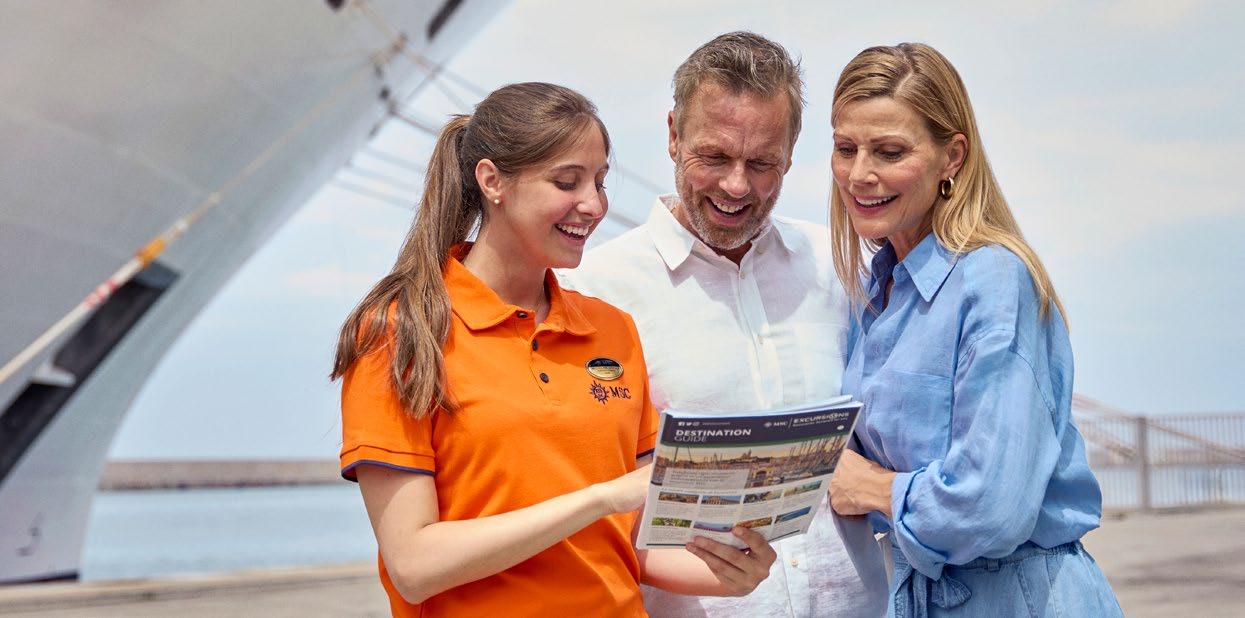
Our responsible tourism approach aligns with the CLIA Guiding Principles for Responsible Tourism aiming to contribute positively to communities by fostering local economic benefits, respecting cultural heritage and mitigating negative environmental and social impacts. These principles guide our engagement strategies, local partnerships, and mitigation actions to drive sustainable tourism.
In 2024, we established a dedicated Sustainability and Community Engagement Manager role within the business to strengthen relationships with local communities, ports, local authorities, NGOs, and other stakeholders. Our evolving strategy reflects community feedback, new destinations and itineraries, itinerary changes, along with sentiment around cruise tourism in key destinations.
We also respond to shifting political and regulatory landscapes. In 2024, in collaboration with CLIA, we hosted 20 Spanish politicians in Barcelona to highlight the industry’s socio-economic value in Europe. In areas facing tourism pressure, we work with CLIA to explore ways to manage visitor numbers.
In 2024, we offered over 4800 excursions across 240 destinations in 90 countries. These included 284 low-impact, low carbon footprint “Protectours”, focused on environmental and social education and low impact transport, such as bike tours and kayaking. For several years, we have collaborated with local tour operators to promote the transition to hybrid and electric buses. While availability, costs, and maintenance present challenges, we successfully introduced these vehicles into our shore excursion operations in Copenhagen and Marseille in 2024, bringing the total number of destinations deploying them to 39.
We work with destinations to manage high visitor numbers and collaborate closely with local tour operators. For example, with our tour operator Intercruises, we introduced an alternative route to ease congestion between the port terminal and Marseille city centre, helping reduce pressure on local infrastructure.

› Cruise guests spend an average of US$96 per day during port visits, and US$242 in embarkation ports (CLIA, 2024).
SCOPE NOTES
MSC Cruises Fleet
Total number of ships from MSC Cruises fleet as of 31st December 2024.
Total number of days of operations across the entire MSC Cruises fleet, from the first to the last completed cruise within the calendar year.
Total number of guests across the entire MSC Cruises fleet, from the first to the last completed cruise within the calendar year.
Sum of guest count per operating day, from the first to the last completed cruise within the calendar year.
Sum of ALB (Available Lower Berth) per operating day, from the first to the last completed cruise within the calendar year.
Total number of ships from Explora Journeys fleet as of 31st December 2024.
Total number of days of Explora Journeys fleet, from the first to the last completed cruise in the calendar year.
Total number of guests on Explora Journeys fleet, from the first to the last completed cruise in the calendar year.
Sum of guest count per operating day, from the first to the last completed cruise within the calendar year.
Sum of ALB (Available Lower Berth) per operating day, from the first to the last completed cruise within the calendar year.
SCOPE NOTES
Fleet + Shorebased
Sum of fossil energy consumption from coal products, crude oil and petroleum products, natural gas, other fossil fuel sources and purchased or acquired electricity, heat, steam and cooling from fossil sources consumed in the calendar year. For fleet, raw data are recorded in metric tonnes for all categories of fossil energy sources and verified, mass to energy conversions are based on LCV values as per MEPC 308(73).
Fleet + Shorebased Total fuel consumption from coal products for onboard fleet and shorebased operations during the calendar year.
Fleet + Shorebased Total consumption of fuels from crude oil and petroleum products for onboard fleet and shorebased operations during the calendar year.
Fleet Fuel consumption from crude oil and petroleum products for fleet operations.
Shorebased Fuel consumption from crude oil and petroleum products at office facilities and the operation of vehicles.
Fleet + Shorebased Total fuel consumption from natural gas for onboard fleet and shorebased operations during the calendar year.
Fleet Fuel consumption of natural gas for the operation of fleets.
Shorebased Fuel consumption of natural gas for energy use at shorebased office facilities.
Fleet + Shorebased Total fuel consumption from other fossil fuels sources for onboard fleet and shorebased operations during the calendar year.
Fleet
Fleet Electricity consumption associated with shore power connections during the calendar year.
Shorebased
Fleet
Fleet
Fleet + Shorebased Total consumption of fuels from renewable sources during the calendar year.
Fleet Consumption of renewable fuels used for fleet operations during the calendar year.
Shorebased
Fleet
Fleet Total amount of freshwater produced onboard and bunkered in the calendar year.
Fleet Total amount of freshwater produced onboard in the calendar year.
Daily volumes are recorded onboard each ship and transmitted to land where data collected from the entire fleet is compared and reconciled.
Fleet Total amount of freshwater bunkered in the calendar year.
Daily volumes are recorded onboard each ship and transmitted to land where data collected from the entire fleet is compared and reconciled.
Fleet Total amount of wastewater generated onboard in the calendar year.
Blackwater includes waste water from toilets, urinals, medical sinks and other similar facilities.
Greywater includes drainage from galleys (food preparation, dishwashing and cleaning), accommodation showers and sinks, and laundry.
Daily volumes are recorded onboard each ship and transmitted to land where data collected from the entire fleet is compared and reconciled.
Fleet Number of ships equipped with Advanced Wastewater Treatment Systems (AWTS).
Total amount of waste generated onboard in the calendar year except hazardous waste.
Daily volumes are recorded for all categories of waste generated onboard each ship and transmitted to land where data collected from the entire fleet is compared and reconciled.
Volume to mass conversions are based on best-available conversion factors.
Total amount of hazardous waste generated onboard in the calendar year. Mass values are recorded and transmitted to land.
Whole workforce Sum of shorebased employees and crew members as per definitions below,
Crew (direct)
Shorebased employees
Crew (concessionaires)
Crew (direct)
Crew (direct)
Total number of directly hired crew members who performed work for MSC Cruises and Explora Journeys in the calendar year, Each crew member is counted only once, regardless of the number of contracts signed during the reporting year,
Total number of shorebased employees within MSC Cruises SA operationally controlled entities as of 31 December 2024,
Total number of crew members hired through concessionaires, who performed work for MSC Cruises and Explora Journeys in the calendar year, Each crew member is counted only once, regardless of the number of contracts signed during the reporting year,
Total number of female crew members who performed work for MSC Cruises and Explora Journeys in the calendar year, Each female crew member is counted only once, regardless of the number of contracts signed during the reporting year, The percentage refers to the total number of female crew members out of the total number of crew members,
Total number of male crew members who performed work for MSC Cruises and Explora Journeys in the calendar year, Each male crew member is counted only once, regardless of the number of contracts signed during the reporting year, The percentage refers to the total number of male crew members out of the total number of crew members,
Crew (direct)
Total number of directly hired crew members covered by Collective Bargaining Agreements who performed work for MSC Cruises and Explora Journeys in the calendar year, Each crew member is counted only once, regardless of the number of contracts signed during the reporting year,
Shorebased employees Total number of employees covered by Collective Bargaining Agreements globally within MSC Cruises SA workforce as of 31 December 2024, Whole workforce
number of employees covered by workers representatives globally within MSC Cruises SA workforce,
Crew (direct)
Total number of directly hired crew members covered by workers representatives who performed work for MSC Cruises and Explora Journeys in the calendar year, Each crew member is counted only once, regardless of the number of contracts signed during the reporting year,
Shorebased employees Total number of employees covered by workers representatives globally within MSC Cruises SA workforce as of 31 December 2024,
Crew (direct)
Shorebased employees
Shorebased employees
Shorebased employees
Total number of crew members who are not paid an adequate wage, In accordance with the requirements of the Corporate Sustainability Reporting Directive, MSC Cruises SA complies with EU Directive 2022/2041 (20), as all crew members’ contracts are aligned with the ILO Maritime Labour Convention (2006),
Total number of employees in top management within MSC Cruises SA operationally controlled entities as of 31st December 2024, Top management includes the following employement levels: Executive Chairman, the CEO of MSC Cruises, the President of Explora Journeys and their direct reports,
Total number of female employees in top management within MSC Cruises SA operationally controlled entities as of 31st December 2024,
Total number of male employees in top management within MSC Cruises SA operationally controlled entities as of 31st December 2024,
Crew (direct)
Crew (direct)
Crew (direct)
Total number of directly hired crew members aged under 30 years old who performed work for MSC Cruises and Explora Joruneys in the calendar year. Each crew member is counted only once, regardless of the number of contracts signed during the reporting year.
Total number of directly hired crew members aged between 30 and 50 years old who performed work for MSC Cruises and Explora Journeys in the calendar year. Each crew member is counted only once, regardless of the number of contracts signed during the reporting year.
Total number of directly hired crew members aged above 50 years old who performed work for MSC Cruises and Explora Joruneys in the calendar year. Each crew member is counted only once, regardless of the number of contracts signed during the reporting year.
Whole workforce Sum of employees and crew members who left the company voluntarily in the calendar year as per definitions below.
Crew (direct)
Shorebased employees
Shorebased employees
Crew (direct)
Total number of directly hired crew members who left the company voluntarily in the calendar year.
Total number of employees within MSC Cruises SA operationally controlled entities that left the company voluntarily in the calendar year.
Total number of shorebased employees within MSC Cruises SA operationally controlled entities that left the company voluntarily in the calendar year divided by the total number of shorebased employees.
Percentage of crew members who stayed on-staff as of 31st December compared to the total number of crew members at the beginning of the calendar year. This metric refers to MSC Cruises crew members only.
Crew (direct) Training hours delivered to crew members in the calendar year.
Crew (direct)
Crew (direct)
Crew (direct) Training hours delivered with no gender specification.
Shorebased employees Training hours delivered to shorebased employees in the calendar year.
Shorebased employees
Shorebased employees
Shorebased employees Training hours delivered with no gender specification.
Crew (direct) Average number of training hours per crew member.
Shorebased employees Average number of training hours per shorebased employee.
Crew (direct)
Crew (direct)
Crew (direct)
Shorebased employees
Percentage of crew members that participated to performance and career reviews. Aligned with the CSRD definition, a regular performance review is defined as a review based on criteria known to the employee and his or her superior undertaken with the knowledge of the employee at least once per year. The review can include an evaluation by the worker’s direct superior, peers, or a wider range of employees. The review can also involve the human resources department.
Percentage of shorebased employees that participated to performance and carreer reviews. Aligned with the CSRD definition, a regular performance review is defined as a review based on criteria known to the employee and his or her superior undertaken with the knowledge of the employee at least once per year. The review can include an evaluation by the worker’s direct superior, peers, or a wider range of employees. The review can also involve the human resources department.
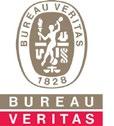
Issued
Name of Ships Manager MSC Cruise Management UK Ltd
Company IMO Number 5908969
Fleet Gross Tonnage 3,007,105 t
Number of Ships 24
With reference to document “MSCCM Emissions Inventory 2024”, provided by MSC Cruise Management UK Ltd, it is hereby confirmed that: the fuel consumption based methodology, where the Greenhouse Gas (GHG) emissions are calculated using the standard emissions factors for fossils fuels, is found in compliance with the FuelEU maritime regulation; the methodology, where the SOx emissions are calculated using the mass-based emission factor, directly determined from fuel sulphur content, is found in compliance with the Third IMO GHG Study; the fuel consumption based methodology, where NOx emissions are calculated using the fuel-based emission factor depending by the result of NOx measurements in accordance with the requirements of the revised Technical Code on Control of Emission of Nitrogen Oxides form Marine Diesel Engines and the BSFC (brake specific fuel consumption) as per maker’s FAT protocol, is found in compliance with the Norwegian NOx tax emissions standard.
With regard to the document "SUSTAINABILITY REPORT 2024", an assessment of the completeness of the contents was carried out with respect to the requirements of EU Directive 2024/825 Article 1 (which integrates Article 6, paragraph 2 of Directive 2005/29/EC with letter d)) relating to future climate declarations and decarbonization plan. In particular, it contains clear, objective and verifiable commitments as well as a detailed and realistic implementation plan that shows how those commitments and targets will be achieved. Following our analysis, nothing has come to our attention to indicate that information in the "SUSTAINABILITY REPORT 2024" are inaccurate or incomplete with respect to the specific requirements of Article 1 of EU Directive 2024/825.
Made at Rome, Italy on 24/07/2025 Signature
de at Rome, ature




